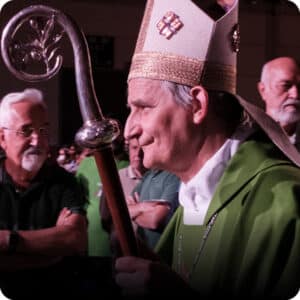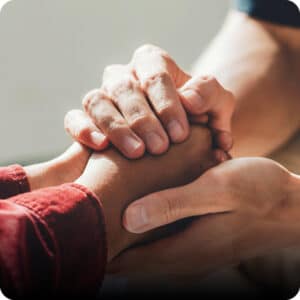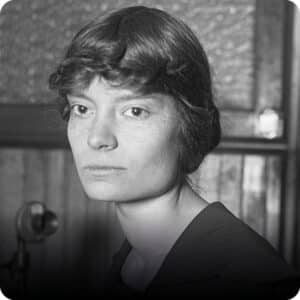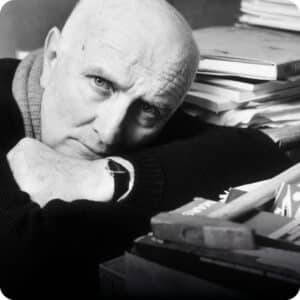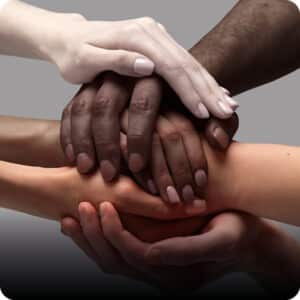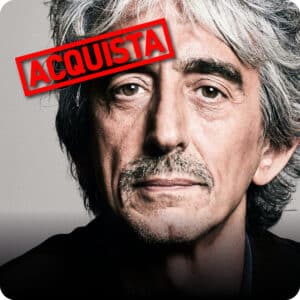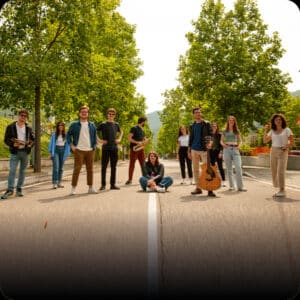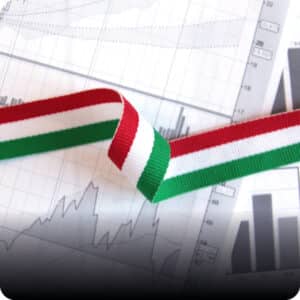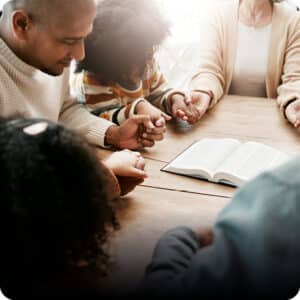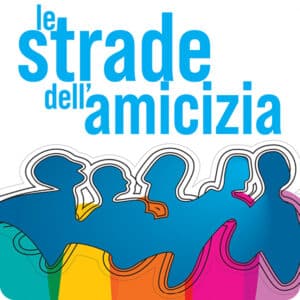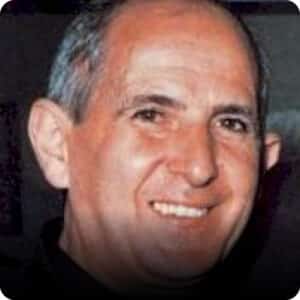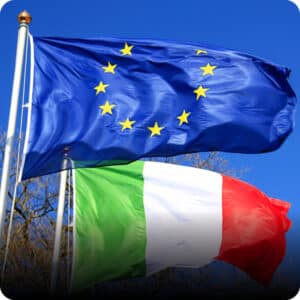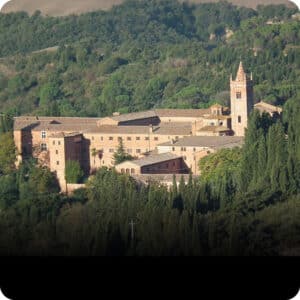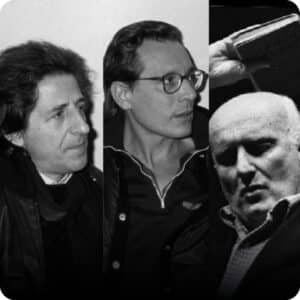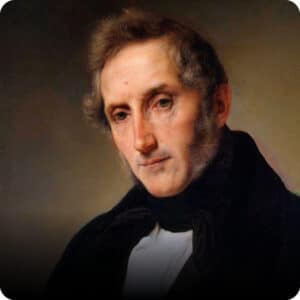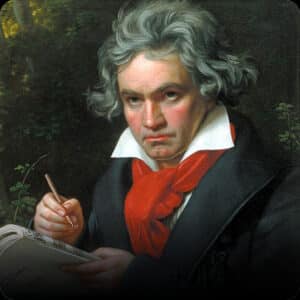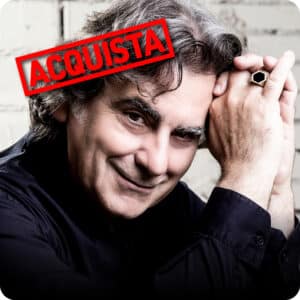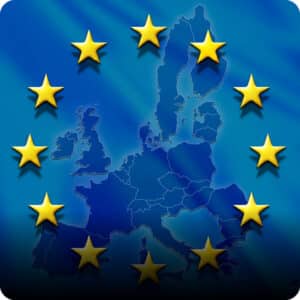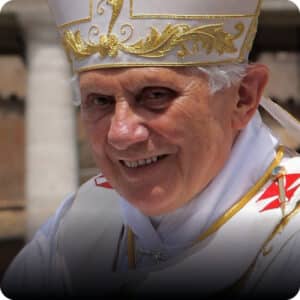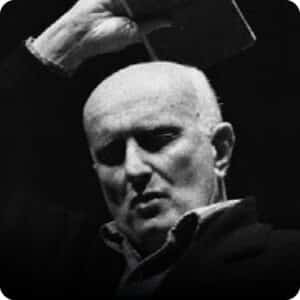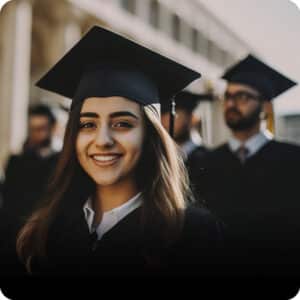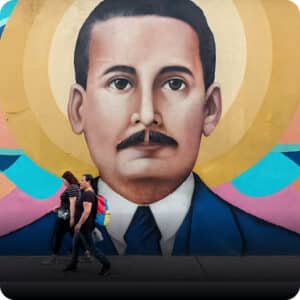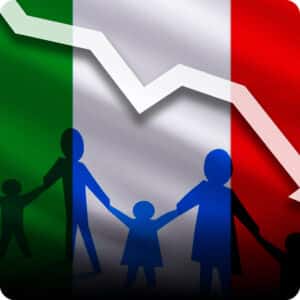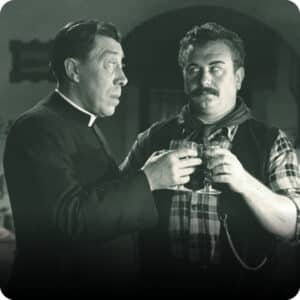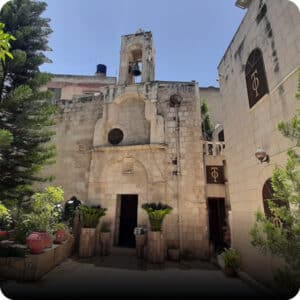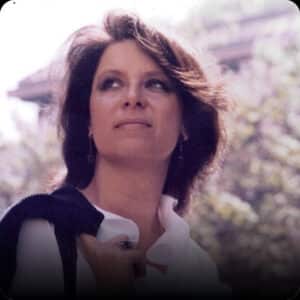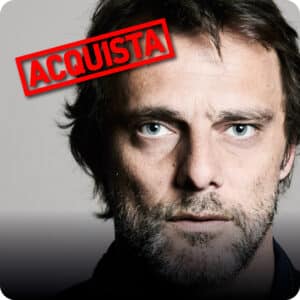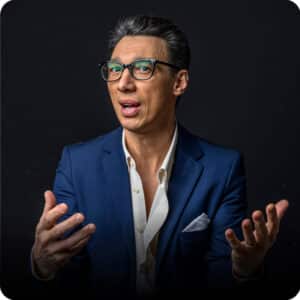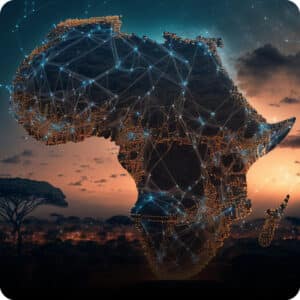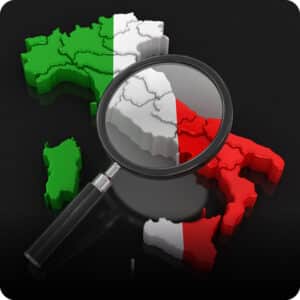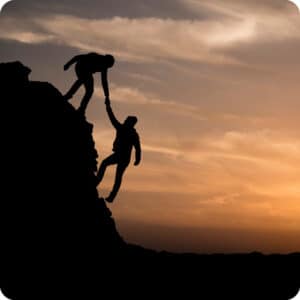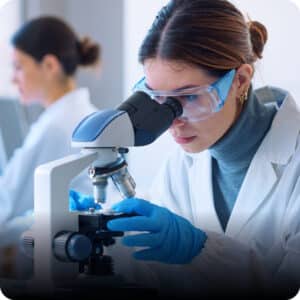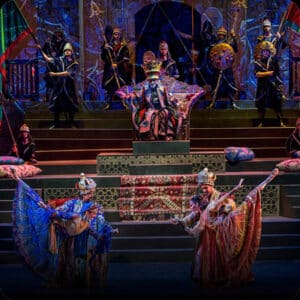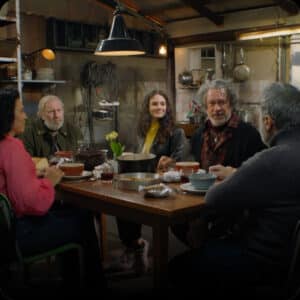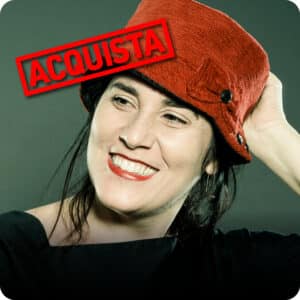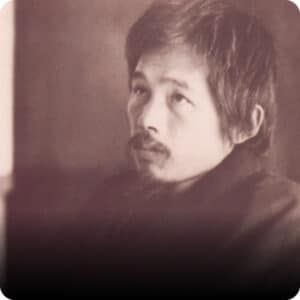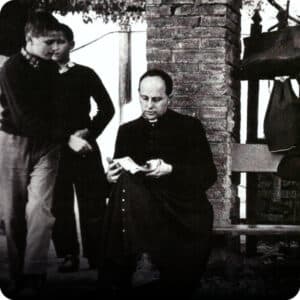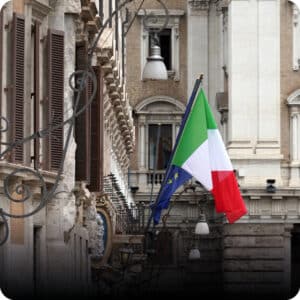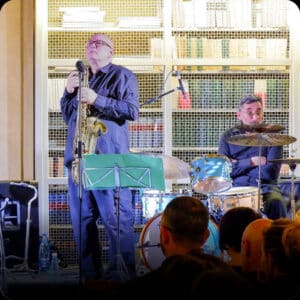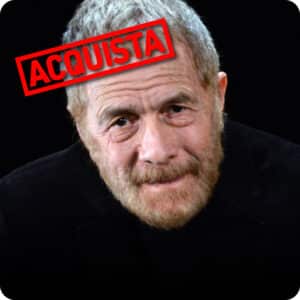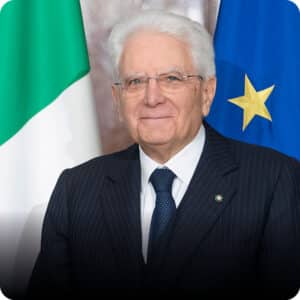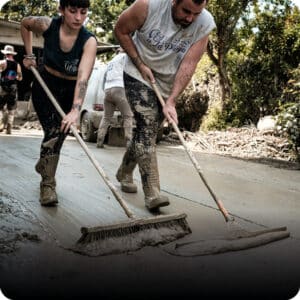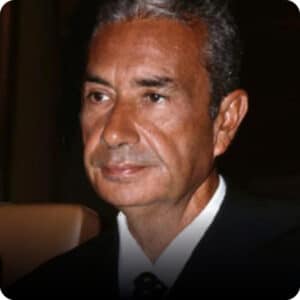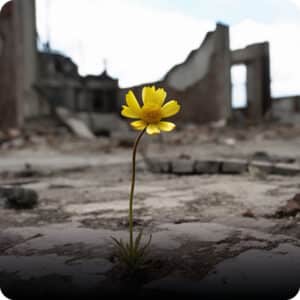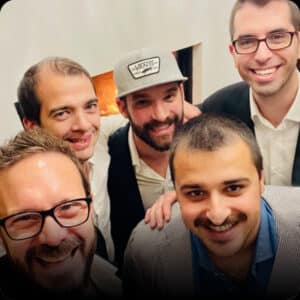
2023 Program
Update Program
Sunday 20 August
Meetings
HOLY MASS
Live on Rai TV
Presided over by His Eminence Cardinal Matteo Zuppi, President of CEI, Archbishop of Bologna. Concelebrated by His Excellency Monsignor Nicolò Anselmi, Bishop of Rimini.
Presided over by His Eminence Cardinal Matteo Zuppi, President of CEI, Archbishop of Bologna. Concelebrated by His Excellency Monsignor Nicolò Anselmi, Bishop of Rimini.
Local translation: ????????
FRATELLI TUTTI. TESTIMONIES OF OPERATIONAL FRIENDSHIP IN THE FOOTSTEPS OF POPE FRANCIS
His Eminence Cardinal Matteo Zuppi, President of CEI, Archbishop of Bologna, in dialogue with Alberto Bonfanti, President of Portofranco; Vittorio Bosio, President of CSI; Regina De Albertis, Technical Director and Delegate Councilor of Borio Mangiarotti S.p.A., President of Assimpredil Ance Milan, Lodi, Monza, and Brianza; Dario Odifreddi, President of Piazza dei Mestieri and President of the Consortium of Work Schools. Moderated by Bernhard Scholz, President of Fondazione Meeting per l'amicizia fra i popoli ETS.
In his encyclical "Fratelli tutti," Pope Francis has summarized in a particularly profound way his proposals and exhortations to promote "fraternity and social friendship." Ten years after his election, we want to listen and engage in dialogue with experiences that can testify to the fruitfulness of this central message of his pontificate, particularly in education and integration. Building upon these testimonies, the dialogue with Cardinal Matteo Maria Zuppi, President of CEI, will highlight fundamental aspects for the construction of social friendship and peace in a world increasingly marked by loneliness, inequalities, fragmentation, and conflicts.
In his encyclical "Fratelli tutti," Pope Francis has summarized in a particularly profound way his proposals and exhortations to promote "fraternity and social friendship." Ten years after his election, we want to listen and engage in dialogue with experiences that can testify to the fruitfulness of this central message of his pontificate, particularly in education and integration. Building upon these testimonies, the dialogue with Cardinal Matteo Maria Zuppi, President of CEI, will highlight fundamental aspects for the construction of social friendship and peace in a world increasingly marked by loneliness, inequalities, fragmentation, and conflicts.
Local translation: ????????
Live streaming: ????
On-demand: ????????
INEXHAUSTIBLE FRIENDSHIPS. DOROTHY DAY AND SOCIAL FRIENDSHIP
Simona Beretta, Director of the University Center for the Social Doctrine of the Church and Responsible Director of the Journal "Dizionario di dottrina sociale della Chiesa," Università Cattolica del Sacro Cuore; Robert Ellsberg, Collaborator and curator of the autobiography Dorothy Day Ho trovato Dio attraverso i suoi poveri (ed. Lev); Giulia Galeotti, Journalist and author of "Siamo una rivoluzione. Vita di Dorothy Day". Moderated by Francesco Magni, Researcher of General and Social Pedagogy at the University of Bergamo.
This event focuses on Dorothy Day (1897-1980), the co-founder of the Catholic Worker Movement in New York in 1933. Dorothy Day was a versatile and outgoing personality, known as a journalist, writer, and activist for social rights. Her conversion to Catholicism and her life filled with dramatic events, joys, sorrows, successes, and misunderstandings make her particularly relevant to the struggles and challenges faced by men and women today. This discussion aims to rediscover her figure and reflect on why it is still worth living for an ideal, shedding tears, loving, suffering, and building something good for oneself and others, starting with the poorest and most abandoned, always guided by the discovery of faith, the unique dynamic of love that generates voluntary poverty, courage, humility, and charity, which we all, deep down, feel the need for.
This event focuses on Dorothy Day (1897-1980), the co-founder of the Catholic Worker Movement in New York in 1933. Dorothy Day was a versatile and outgoing personality, known as a journalist, writer, and activist for social rights. Her conversion to Catholicism and her life filled with dramatic events, joys, sorrows, successes, and misunderstandings make her particularly relevant to the struggles and challenges faced by men and women today. This discussion aims to rediscover her figure and reflect on why it is still worth living for an ideal, shedding tears, loving, suffering, and building something good for oneself and others, starting with the poorest and most abandoned, always guided by the discovery of faith, the unique dynamic of love that generates voluntary poverty, courage, humility, and charity, which we all, deep down, feel the need for.
Local translation: ??????
Live streaming: ????
On-demand: ??????
A FRIENDSHIP THAT OPENS TO THE WORLD. GIOVANNI TESTORI, 100 YEARS SINCE HIS BIRTH
Riccardo Bonacina, Journalist; Angela Demattè, Playwright and actress; Emilia Guarnieri, Co-founder of the Meeting per l'amicizia fra i popoli. Moderated by Davide Dall'Ombra, Director of Casa Testori Cultural Association.
In March 1978, an article by Giovanni Testori on the Via Fani massacre published in Corriere della Sera caught the attention of some university students from the Communion and Liberation movement. They asked to meet him, and this encounter in his Milanese studio at Via Brera 8 marked the beginning of a great friendship. This friendship was also very "operational" from a human and cultural perspective, encompassing theater, collaboration with the Sabato magazine, participation in the Meeting per l'amicizia fra i popoli from its first edition, and a special bond with don Giussani. Riccardo Bonacina, who witnessed that first meeting, and Emilia Guarnieri, who witnessed Testori's presence at the Meeting, along with Angela Demattè, who didn't know Testori personally but, as a playwright and actress, documented the fruits of that friendship and mentorship through her experience, will discuss the impact and legacy of this friendship.
In March 1978, an article by Giovanni Testori on the Via Fani massacre published in Corriere della Sera caught the attention of some university students from the Communion and Liberation movement. They asked to meet him, and this encounter in his Milanese studio at Via Brera 8 marked the beginning of a great friendship. This friendship was also very "operational" from a human and cultural perspective, encompassing theater, collaboration with the Sabato magazine, participation in the Meeting per l'amicizia fra i popoli from its first edition, and a special bond with don Giussani. Riccardo Bonacina, who witnessed that first meeting, and Emilia Guarnieri, who witnessed Testori's presence at the Meeting, along with Angela Demattè, who didn't know Testori personally but, as a playwright and actress, documented the fruits of that friendship and mentorship through her experience, will discuss the impact and legacy of this friendship.
Local translation: ????
Live streaming: ????
On-demand: ????
WORK: A VOCATION?
In collaboration with Cdo
Lucia Albano, Undersecretary of the Ministry of Economy and Finance; Stefania Brancaccio, General Secretary of UCID; Sonia Malaspina, HR Director of Danone Italy & Greece; Alberto Paltrinieri, Paltrinieri Winery, Modena; Enzo Porzio, Paranza Cooperative, Naples. Moderated by Andrea Dellabianca, President of Compagnia delle Opere Milano.
What is expected from work today? Is salary no longer enough, or is it about the career? Older people say that young ones are fragile, while the young claim to want something different, demanding better conditions. Or perhaps they no longer wish to build? The pandemic has brought about a revolution in work relationships and our relationship with work. However, it's not just about new business and personal strategies, nor is it solely about generational differences. For everyone, work is a test of the substance of their own life. What does work mean? What fulfills me? Why is it worth making sacrifices to work and fulfill oneself? These questions will be discussed by the Undersecretary of Economy and Finance, the Secretary-General of the Christian Union of Entrepreneurs and Managers, along with the HR Manager of a large multinational group, an entrepreneur successfully running their family-owned winery, and a young person from an innovative cooperative that has created employment opportunities in Naples.
Lucia Albano, Undersecretary of the Ministry of Economy and Finance; Stefania Brancaccio, General Secretary of UCID; Sonia Malaspina, HR Director of Danone Italy & Greece; Alberto Paltrinieri, Paltrinieri Winery, Modena; Enzo Porzio, Paranza Cooperative, Naples. Moderated by Andrea Dellabianca, President of Compagnia delle Opere Milano.
What is expected from work today? Is salary no longer enough, or is it about the career? Older people say that young ones are fragile, while the young claim to want something different, demanding better conditions. Or perhaps they no longer wish to build? The pandemic has brought about a revolution in work relationships and our relationship with work. However, it's not just about new business and personal strategies, nor is it solely about generational differences. For everyone, work is a test of the substance of their own life. What does work mean? What fulfills me? Why is it worth making sacrifices to work and fulfill oneself? These questions will be discussed by the Undersecretary of Economy and Finance, the Secretary-General of the Christian Union of Entrepreneurs and Managers, along with the HR Manager of a large multinational group, an entrepreneur successfully running their family-owned winery, and a young person from an innovative cooperative that has created employment opportunities in Naples.
Local translation: ????
On-demand: ????
ENERGY COMMUNITIES AND ENERGY POVERTY: THE DEMOCRATIZATION OF ENERGY
Michele Emiliano, President of the Puglia Region; Fabrizio Iaccarino, Head of Sustainability and Institutional Affairs Enel Italy; Most Reverend Monsignor Filippo Santoro, Emeritus Archbishop of Taranto, Special Delegate of the Holy Father for the Memores Domini; Mario Antonio Scino, Chief of Staff of the Minister of the Environment and Energy Security. Moderated by Giuliano Frosini, Professor at Luiss Business School.
This meeting focuses on the role of energy communities in promoting equitable access to energy and combating energy poverty. Knowledge and perspectives will be shared on energy communities as a tool to democratize energy, fostering active citizen participation and decentralized production of renewable energy. Additionally, the issue of energy poverty will be addressed, exploring innovative solutions to ensure access to energy for all, with particular attention to sustainability and social justice. The goal is to achieve a more equitable, inclusive, and sustainable energy system.
This meeting focuses on the role of energy communities in promoting equitable access to energy and combating energy poverty. Knowledge and perspectives will be shared on energy communities as a tool to democratize energy, fostering active citizen participation and decentralized production of renewable energy. Additionally, the issue of energy poverty will be addressed, exploring innovative solutions to ensure access to energy for all, with particular attention to sustainability and social justice. The goal is to achieve a more equitable, inclusive, and sustainable energy system.
ERASE CULTURES OR BUILD CULTURE?
Sergio Belardinelli, Full Professor of Sociology of Cultural and Communicative Processes, University of Bologna; François-Xavier Bellamy, Member of the European Parliament, French philosopher and intellectual; Joseph H.H. Weiler, University Professor at NYU Law School and Senior Fellow at the Center for European Studies at Harvard. Moderated by Andrea Simoncini, Vice President of Fondazione Meeting per l'amicizia fra i popoli ETS, Constitutional Law Professor, University of Florence.
The culture of cancellation, also known as "cancel culture," is a disturbing and overwhelming phenomenon. This expression refers to the widespread tendency, present not only on the internet but also in many physical social environments, to remove or "cancel" individuals, companies, books, and films that are deemed guilty of promoting values contrary to minority rights, gender equality, equality in general, and what is referred to as "political correctness." From the world of cinema to universities, from schools to cultural spaces, there is a growing push to eliminate thoughts and ideas—and especially the people who hold them—considered contrary to the basic principles of coexistence, common values, and fundamental freedoms. The paradox is that in defending freedom, the right to express oneself is denied. It is an absolute failure of education to have to "cancel" someone or something so that certain ideas do not spread—assuming that it is always right and indisputable to cancel them. To discuss this terrible paradox, which puts contemporary freedom at risk of self-destruction, three prominent figures will participate: Sergio Belardinelli, sociologist; Joseph Weiler, jurist; and Francois-Xavier Bellamy, Member of the European Parliament.
The culture of cancellation, also known as "cancel culture," is a disturbing and overwhelming phenomenon. This expression refers to the widespread tendency, present not only on the internet but also in many physical social environments, to remove or "cancel" individuals, companies, books, and films that are deemed guilty of promoting values contrary to minority rights, gender equality, equality in general, and what is referred to as "political correctness." From the world of cinema to universities, from schools to cultural spaces, there is a growing push to eliminate thoughts and ideas—and especially the people who hold them—considered contrary to the basic principles of coexistence, common values, and fundamental freedoms. The paradox is that in defending freedom, the right to express oneself is denied. It is an absolute failure of education to have to "cancel" someone or something so that certain ideas do not spread—assuming that it is always right and indisputable to cancel them. To discuss this terrible paradox, which puts contemporary freedom at risk of self-destruction, three prominent figures will participate: Sergio Belardinelli, sociologist; Joseph Weiler, jurist; and Francois-Xavier Bellamy, Member of the European Parliament.
Local translation: ????????
Live streaming: ????
On-demand: ????????
NUCLEAR FUSION: THE ENERGY OF THE STARS FOR THE FUTURE OF THE PLANET
Organized by Euresis Association.
Ambrogio Fasoli, Director of the Swiss Plasma Center (Ecole Polytechnique Fédérale de Lausanne), Lausanne, President of the EUROfusion Consortium; Marcella Marconi, Director of the Capodimonte Astronomical Observatory, National Institute of Astrophysics, Naples. Moderated by Carlo Sozzi, Institute for Plasma Science and Technology, National Research Council, Milan.
The burning of the Sun during our days and the shining of the stars at night are spectacles we can witness daily, often without asking ourselves what we are truly observing. However, the question of what is happening before our eyes has led to one of the most fruitful and surprising scientific paths of the past two centuries, with enormous potential for application: nuclear fusion. This is the energy source of the stars and, ultimately, of every source of energy available on our Earth. The study of the physical processes that cause the birth and evolution of stars, which govern their luminosity, is rich in knowledge about our Universe. On the other hand, the success of attempts to reproduce and control nuclear fusion in the laboratory to harness the enormous amount of energy it would provide is a valuable contribution to solving one of the most urgent problems of our time. Two protagonists of these fascinating scientific endeavors will show us "where we are."
Ambrogio Fasoli, Director of the Swiss Plasma Center (Ecole Polytechnique Fédérale de Lausanne), Lausanne, President of the EUROfusion Consortium; Marcella Marconi, Director of the Capodimonte Astronomical Observatory, National Institute of Astrophysics, Naples. Moderated by Carlo Sozzi, Institute for Plasma Science and Technology, National Research Council, Milan.
The burning of the Sun during our days and the shining of the stars at night are spectacles we can witness daily, often without asking ourselves what we are truly observing. However, the question of what is happening before our eyes has led to one of the most fruitful and surprising scientific paths of the past two centuries, with enormous potential for application: nuclear fusion. This is the energy source of the stars and, ultimately, of every source of energy available on our Earth. The study of the physical processes that cause the birth and evolution of stars, which govern their luminosity, is rich in knowledge about our Universe. On the other hand, the success of attempts to reproduce and control nuclear fusion in the laboratory to harness the enormous amount of energy it would provide is a valuable contribution to solving one of the most urgent problems of our time. Two protagonists of these fascinating scientific endeavors will show us "where we are."
Local translation: ????
Live streaming: ????
On-demand: ????
SKILLS, TALENTS, AND PARTICIPATION IN WORK
Marco Ceresa, Group Chief Executive Officer of Randstad Italy; Manuela Kron, Director Corporate Affairs & Marketing Consumer Communication of the Nestlé Group in Italy; Mauro Nori, Chief of Staff of the Ministry of Labor and Social Policies; Luigi Sbarra, General Secretary of CISL; Stefano Scaroni, CEO of Deles Group. Moderated by Cesare Pozzoli, Labor Law Attorney.
The current shortage of skilled workers and competencies affects companies worldwide. There are multiple factors that have contributed to this phenomenon in recent years: the inability of work to fully satisfy personal fulfillment, misalignment with reference values, flexibility and work-life balance, frustrated professional ambitions, and difficulties in adapting to technological changes. How can we act to respond promptly to new demands and needs in order to attract and retain talent?
The current shortage of skilled workers and competencies affects companies worldwide. There are multiple factors that have contributed to this phenomenon in recent years: the inability of work to fully satisfy personal fulfillment, misalignment with reference values, flexibility and work-life balance, frustrated professional ambitions, and difficulties in adapting to technological changes. How can we act to respond promptly to new demands and needs in order to attract and retain talent?
Local translation: ??
On-demand: ??
HOSPITALITY: THE FRUIT OF FRIENDSHIP
Monsignor Massimo Camisasca, Emeritus Bishop of Reggio Emilia - Guastalla; Silvio Cattarina, Founder and President of L'Imprevisto Social Cooperative; Catia Petta, Foster Family; Luca Sommacal, President of the Association of Families for Hospitality; Jimmy Tamba, Coordinator of the Distance Support project for Avsi in Freetown, Sierra Leone. Moderated by Martina Saltamacchia, Distinguished Associate Professor of Medieval History at the University of Nebraska, Omaha.
This event offers a valuable opportunity to explore the link between hospitality and friendship, thanks to the testimonies of some witnesses and the reflection on the theme entrusted to Monsignor Camisasca. Hospitality, which can take various forms and situations such as adoption, foster care, and the welcoming of migrants, war refugees, or people fleeing natural disasters and extraordinary events, as well as young people struggling with various dependencies, arises from a constitutive and deep relationship: friendship. Friendship always arises from an unforeseen encounter and sharing. It can generate lasting, meaningful, and ever-new relationships and is a source of hope in the face of situations and adversities that deeply challenge the human heart.
Local translation: ??????
Live streaming: ????
On-demand: ??????
Shows
MONSIEUR IBRAHIM AND THE FLOWERS OF THE QUR’ĀN
By Eric-Emmanuel Schmitt, with Sergio Rubini and Simone Zanchini on the accordion, direction Otello Cenci.
In the intricate crossroads of a popular Parisian neighborhood where the names of the streets taste like fables (rue Bleue, rue de Paradis), the teenager Momo lives with a father sunk in a silent and gloomy depression. In the same neighborhood lives Monsieur Ibrahim, the only Arab in a "Jewish" street, owner of the grocery store where Momo goes for his daily shopping and occasionally doesn't hesitate to sneak a few cans of preserves. This is how the story of friendship begins, woven with irony, innocence, and profound wisdom, between the Jewish boy and the elderly "Arab." Like in a fable or a parable that doesn't intend to give moral lessons but only to propose a dream to decipher, the two protagonists embark on a journey towards the wider world, towards a freedom that makes them climb upwards, guided by that art of smiling at life enclosed in the precious flowers of the Quran. The unmistakable narrating voice of Sergio Rubini brings this tale of deep friendship to life, accompanied by the accordion notes of Simone Zanchini, one of the most innovative musicians on the international scene. In collaboration with Comune di Rimini and Sagra Musicale Malatestiana.
In collaboration with Rimini Italian Capital of Culture Candidate 2026 and Sagra Musicale Malatestiana BUY TICKETS
In the intricate crossroads of a popular Parisian neighborhood where the names of the streets taste like fables (rue Bleue, rue de Paradis), the teenager Momo lives with a father sunk in a silent and gloomy depression. In the same neighborhood lives Monsieur Ibrahim, the only Arab in a "Jewish" street, owner of the grocery store where Momo goes for his daily shopping and occasionally doesn't hesitate to sneak a few cans of preserves. This is how the story of friendship begins, woven with irony, innocence, and profound wisdom, between the Jewish boy and the elderly "Arab." Like in a fable or a parable that doesn't intend to give moral lessons but only to propose a dream to decipher, the two protagonists embark on a journey towards the wider world, towards a freedom that makes them climb upwards, guided by that art of smiling at life enclosed in the precious flowers of the Quran. The unmistakable narrating voice of Sergio Rubini brings this tale of deep friendship to life, accompanied by the accordion notes of Simone Zanchini, one of the most innovative musicians on the international scene. In collaboration with Comune di Rimini and Sagra Musicale Malatestiana.
In collaboration with Rimini Italian Capital of Culture Candidate 2026 and Sagra Musicale Malatestiana BUY TICKETS
THE STRANGERS
The Strangers were born following the proposal of some young music enthusiasts, strangers (hence the name of the band), to play together during a summer vacation. From that way of being together, a staff of 15 elements was born surprisingly, coming from Veneto, Lombardy and Trentino.
Their concerts have only one goal: to make people dance! The vast repertoire, which ranges from Funk to Disco, from Rock and Roll to Pop, with the addition of their unpublished works such as "The best is yet to come", will involve the entire audience of the Meeting.
Their concerts have only one goal: to make people dance! The vast repertoire, which ranges from Funk to Disco, from Rock and Roll to Pop, with the addition of their unpublished works such as "The best is yet to come", will involve the entire audience of the Meeting.
Monday 21 August
Meetings
SUPPORTING DEVELOPMENT. NEW POLICIES FOR AN INNOVATIVE ECONOMY
In collaboration with Fondazione per la Sussidiarietà.
Dialogue with Stefano Barrese, Head of the Banca dei Territori division at Intesa Sanpaolo; Maria Bianca Farina, President of Ania; Francesco Mutti, CEO of Mutti Spa and President of Centromarca. With the participation of Giancarlo Giorgetti, Minister of Economy and Finance. Moderated by Giorgio Vittadini, President of the Foundation for Subsidiarity.
Optimists and pessimists confront each other on the economic development of Italy. Two underlying themes are at the core of the daily debate. The first one: how to measure this development. Is it sufficient to look at GDP, or should we consider a type of development that takes into account the overall well-being of the nation, including education, healthcare, and welfare, measurable with new tools such as the BES (Benessere Equo e Sostenibile - Sustainable and Equitable Well-being)? The second one: is it still the time for laissez-faire and the invisible hand, or is it time for a new strategic role of the State as a support to the business world? After a dialogue among protagonists of the Italian economic life, Minister of Economy and Finance Giorgetti will shed light on the subject.
Dialogue with Stefano Barrese, Head of the Banca dei Territori division at Intesa Sanpaolo; Maria Bianca Farina, President of Ania; Francesco Mutti, CEO of Mutti Spa and President of Centromarca. With the participation of Giancarlo Giorgetti, Minister of Economy and Finance. Moderated by Giorgio Vittadini, President of the Foundation for Subsidiarity.
Optimists and pessimists confront each other on the economic development of Italy. Two underlying themes are at the core of the daily debate. The first one: how to measure this development. Is it sufficient to look at GDP, or should we consider a type of development that takes into account the overall well-being of the nation, including education, healthcare, and welfare, measurable with new tools such as the BES (Benessere Equo e Sostenibile - Sustainable and Equitable Well-being)? The second one: is it still the time for laissez-faire and the invisible hand, or is it time for a new strategic role of the State as a support to the business world? After a dialogue among protagonists of the Italian economic life, Minister of Economy and Finance Giorgetti will shed light on the subject.
Local translation: ????
Live streaming: ????
On-demand: ????
A DIALOGUE BETWEEN PHYSICS AND LITERATURE
Juan José Gómez Cadenas, Physicist at the Ikerbasque Foundation, Donostia International Physics Center; Luca Doninelli, Writer. Moderated by Marco Bersanelli, Professor of Physics and Astrophysics, University of Milan.
Science and poetry are sometimes considered as two separate worlds, almost two narratives of reality that are incompatible with each other. However, in the distinction of the underlying questions and the methods that are employed, they have more in common than is commonly thought: both require a deep attention to reality, a willingness to discover what is new and unexpected, a desire for synthesis and effective communication. Through their testimonies, two established figures, a physicist and a writer, will lead us to the discovery of how in the 21st century the humanistic dimension and the scientific dimension can meet and coexist, without merging with each other, but rather uncovering the traits of their complementarity and the deep root from which both arise.
Science and poetry are sometimes considered as two separate worlds, almost two narratives of reality that are incompatible with each other. However, in the distinction of the underlying questions and the methods that are employed, they have more in common than is commonly thought: both require a deep attention to reality, a willingness to discover what is new and unexpected, a desire for synthesis and effective communication. Through their testimonies, two established figures, a physicist and a writer, will lead us to the discovery of how in the 21st century the humanistic dimension and the scientific dimension can meet and coexist, without merging with each other, but rather uncovering the traits of their complementarity and the deep root from which both arise.
Local translation: ????
Live streaming: ????
On-demand: ????
FRIENDSHIP IN THE BIBLE
Joseph H.H. Weiler, University Professor at NYU Law School and Senior Fellow at the Center for European Studies at Harvard. Introducing Stefano Alberto, Professor of Theology, Università Cattolica del Sacro Cuore.
The Bible explicitly speaks about friendship and also provides some luminous examples, each different from the other. In the traditional event "Reading the Bible with Joseph Weiler," we will examine both aspects. Here are some examples of explicit teachings: A friend loves at all times and a brother is born for adversity (Proverbs 17:17). There are companions who lead to ruin, but there are also friends who are more loyal than a brother (Proverbs 18:24). Faithful are the wounds of a friend, deceitful are the kisses of an enemy. The fragrance of incense brings joy to the heart, and the sweetness of a friend soothes the soul (Proverbs 27:6,9). And here are some examples of deep friendships: Ruth and Naomi, David and Jonathan, and of course Jesus and his apostles: "You are my friends if you do what I command. I no longer call you servants because a servant does not know his master's business. Instead, I have called you friends, for everything that I learned from my Father I have made known to you" (John 15:14-15).
The Bible explicitly speaks about friendship and also provides some luminous examples, each different from the other. In the traditional event "Reading the Bible with Joseph Weiler," we will examine both aspects. Here are some examples of explicit teachings: A friend loves at all times and a brother is born for adversity (Proverbs 17:17). There are companions who lead to ruin, but there are also friends who are more loyal than a brother (Proverbs 18:24). Faithful are the wounds of a friend, deceitful are the kisses of an enemy. The fragrance of incense brings joy to the heart, and the sweetness of a friend soothes the soul (Proverbs 27:6,9). And here are some examples of deep friendships: Ruth and Naomi, David and Jonathan, and of course Jesus and his apostles: "You are my friends if you do what I command. I no longer call you servants because a servant does not know his master's business. Instead, I have called you friends, for everything that I learned from my Father I have made known to you" (John 15:14-15).
Local translation: ??????
On-demand: ??????
THE MARKETS AND THE FOOD OF THE CITIES OF THE FUTURE
Giaime Berti, co-chair Resilient Local Food Supply Chains Alliance; Massimo Pallottini, President Italmercati; Andrea Calori, President EStà - Economy and Sustainability; Fabrizio Marzulli, Deputy Mayor of Taranto. Moderated by Carmelo Troccoli, General Director of the World Farmer Market Coalition.
HUMAN EXISTENCE IS AN INEXHAUSTIBLE FRIENDSHIP
H.E. Monsignor Giuseppe Baturi, Metropolitan Archbishop of Cagliari and Secretary General of the Italian Episcopal Conference. Introducing Bernhard Scholz, President of the Fondazione Meeting per l'amicizia fra i popoli ETS.
This year's Meeting aims to rediscover friendship, its origin, its creative strength, and the good that can arise from it for everyone. Friendship has always been considered one of the highest expressions of human relationships, where trust, support, and love become mutual. In the Christian experience, the relationship with God himself takes the form of an "inexhaustible friendship" that has the vocation to become a catalyst for more humane relationships in an increasingly fragmented society and a prophecy for peace in a world marked by violence and wars.
This year's Meeting aims to rediscover friendship, its origin, its creative strength, and the good that can arise from it for everyone. Friendship has always been considered one of the highest expressions of human relationships, where trust, support, and love become mutual. In the Christian experience, the relationship with God himself takes the form of an "inexhaustible friendship" that has the vocation to become a catalyst for more humane relationships in an increasingly fragmented society and a prophecy for peace in a world marked by violence and wars.
Local translation: ????????
Live streaming: ????
On-demand: ????????
INEXHAUSTIBLE FRIENDSHIPS. DON PINO PUGLISI, THE TESTIMONY OF MARTYRDOM
Antonio Balsamo, Magistrate; H.E. Monsignor Corrado Lorefice, Archbishop of Palermo. Introducing Salvatore Taormina, Cultural Editorial Staff of the Meeting per l'amicizia fra i popoli. Moderated by Vincenzo Morgante, Director of TV2000.
Thirty years after the murder of blessed Pino Puglisi, which took place at the hands of the mafia on September 15, 1993, this meeting aims to focus on the defining characteristics of his martyrdom. Through the contribution of authoritative voices from the ecclesiastical, judicial, and media contexts, the event will retrace the key moments of a human and priestly testimony that remains relevant, in which Christian resistance against the mafia has taken on the specific and primary role of passionate educational action, particularly directed towards the younger generations, driven by a constant commitment to the truth of the individual and their social bonds.
Local translation: ??????
Live streaming: ????
On-demand: ??????
EUROPE OF STATES OR EUROPE OF REGIONS?
Francesco Acquaroli, President of the Marche Region; Sergio Emidio Bini, Councillor for Productive Activities and Tourism Friuli Venezia Giulia Region; Donatella Tesei, President of the Umbria Region; Mario Tonina, Vice President of the Autonomous Province of Trento. Moderated by Andrea Simoncini, Vice President of the Fondazione Meeting per l'amicizia fra i popoli ETS, Professor of Constitutional Law at the University of Florence.
For over forty years, the Meeting in Rimini has been inspired by two values considered essential: Europeanism and regionalism. On one hand, regions and Europe represent the two directions of growth and development in our Republic. On the other hand, these two tensions - supranationality and regionalism - are not antithetical, but just like the fundamental relationships of growth in a person, they represent the fundamental relationships of growth. Both of these directions seem to be under discussion today - as seen, for example, in the two proposed constitutional reforms currently being discussed: one aimed at restoring national sovereignty against European sovereignty, and the other introducing the so-called "differentiated regionalism." What is the future, then, of "regionalism" in the European perspective? To address this topic, several presidents of regions and the Autonomous Province of Trento are convening in Rimini, as a regular summer appointment, to revitalize the experience of regional governance, called upon by the Meeting to measure themselves against the broader horizon of European integration.
For over forty years, the Meeting in Rimini has been inspired by two values considered essential: Europeanism and regionalism. On one hand, regions and Europe represent the two directions of growth and development in our Republic. On the other hand, these two tensions - supranationality and regionalism - are not antithetical, but just like the fundamental relationships of growth in a person, they represent the fundamental relationships of growth. Both of these directions seem to be under discussion today - as seen, for example, in the two proposed constitutional reforms currently being discussed: one aimed at restoring national sovereignty against European sovereignty, and the other introducing the so-called "differentiated regionalism." What is the future, then, of "regionalism" in the European perspective? To address this topic, several presidents of regions and the Autonomous Province of Trento are convening in Rimini, as a regular summer appointment, to revitalize the experience of regional governance, called upon by the Meeting to measure themselves against the broader horizon of European integration.
Local translation: ????
Live streaming: ????
On-demand: ????
FRIENDSHIP AMONG CULTURES. CULTURES THAT NURTURE FRIENDSHIP
In cooperation with the Ministry of Foreign Affairs and International Cooperation
Ahmed bin Rakkad Al Ameri, Chairman of the Sharjah Book Authority (SBA); Antonella Sciarrone Alibrandi, Undersecretary of the Dicastery for Culture and Education and Professor of Economics Law at Università Cattolica del Sacro Cuore; Maria Tripodi, Undersecretary of State for Foreign Affairs and International Cooperation. Welcome speech by Luca Beccari, Secretary of State for Foreign Affairs, International Economic Cooperation, and Telecommunications of the Republic of San Marino. Introduced by Bernhard Scholz, President of the Meeting Foundation for Friendship among Peoples ETS. Moderated by Wael Farouq, Professor of Arabic Language and Literature at Università Cattolica del Sacro Cuore.
On one hand, globalization has brought different cultures closer together; however, in some expressions, it has also contributed to their relativization. Yet, it is precisely the authenticity of each religious and cultural expression that makes it interesting and often fascinating. It is not flattening, but in-depth exploration that enriches the encounter between cultures and makes it valuable for everyone. The visit of the Meeting Foundation to the Sharjah International Book Fair (SIBF), one of the largest book fairs globally, was an extraordinary experience of this friendship between cultures. Together with Università Cattolica del Sacro Cuore, which has been collaborating with the Sharjah Book Fair, and the founder of the Kalam Foundation, we aim to document the possibility of friendship between cultures that nurture friendship themselves. In this context, the perspective and actions implemented by International Cooperation as drivers of development, enrichment of relationships, and active support for culture are fundamental.
Local translation: ????????
On-demand: ????????
WORK GENERATION. UNDERSTANDING THE CHANGES
Organized by Foundation for Subsidiariety.
Marina Calderone, Minister of Labor and Social Policies; Piero Cipollone, Deputy Director General of the Bank of Italy; Mario Mezzanzanica, Professor of Computer Science and Engineering, University of Milano-Bicocca, Labor Department of Fondazione per la Sussidiarietà; Massimo Monacelli, General Manager of Generali Italia. Giorgio Vittadini, President of Fondazione per la Sussidiarietà. Hosted by Enrico Castelli and Irene Elisei.
Work in recent decades has been undergoing significant changes, starting with the relevance of corporate welfare. It's not only about structural aspects but also its meaning. The situation of young people, women, and especially immigrants is emblematic. The 2023 Talk of the Subsidiarity Foundation will focus on this topic. The first episode will outline the institutional framework, the context, and the issues around which the debate revolves. Services and in-depth analyses will enliven the dialogue.
Marina Calderone, Minister of Labor and Social Policies; Piero Cipollone, Deputy Director General of the Bank of Italy; Mario Mezzanzanica, Professor of Computer Science and Engineering, University of Milano-Bicocca, Labor Department of Fondazione per la Sussidiarietà; Massimo Monacelli, General Manager of Generali Italia. Giorgio Vittadini, President of Fondazione per la Sussidiarietà. Hosted by Enrico Castelli and Irene Elisei.
Work in recent decades has been undergoing significant changes, starting with the relevance of corporate welfare. It's not only about structural aspects but also its meaning. The situation of young people, women, and especially immigrants is emblematic. The 2023 Talk of the Subsidiarity Foundation will focus on this topic. The first episode will outline the institutional framework, the context, and the issues around which the debate revolves. Services and in-depth analyses will enliven the dialogue.
Local translation: ????
On-demand: ????
THE TASTE OF EVERYDAY LIFE. WORK AND SELF-FULFILLMENT, FROM SAN BENEDETTO TO TODAY
Stefano Berni, General Manager, Consortium for the Protection of Grana Padano; Alessio Mammi, Councilor for Agriculture and Agri-food, Hunting and Fishing of the Emilia-Romagna Region; Roberto Ravaioli, Curator of the Exhibition "The Taste of Everyday Life. Work and Self-Fulfillment, from San Benedetto to Today"; Diego Remelli, President of Goito Get Up; Fabio Saini, CEO and Technical Director of Laica Spa. Moderated by Camillo Gardini, President of Compagnia delle Opere Agroalimentare.
Is it possible to live a fulfilling work life aligned with one's desires? What can foster creativity and positivity in individuals when facing the reality in a context of widespread uncertainty? These are the questions that permeate the entire journey of the exhibition "Il gusto del quotidiano" (The Taste of Everyday Life), an immersive and engaging exploration that reinterprets the current crisis by drawing parallels with another major crisis, the aftermath of the fall of the Western Roman Empire. Speakers will engage in a discussion on these questions, drawing from their own experiences in the realm of work.
Is it possible to live a fulfilling work life aligned with one's desires? What can foster creativity and positivity in individuals when facing the reality in a context of widespread uncertainty? These are the questions that permeate the entire journey of the exhibition "Il gusto del quotidiano" (The Taste of Everyday Life), an immersive and engaging exploration that reinterprets the current crisis by drawing parallels with another major crisis, the aftermath of the fall of the Western Roman Empire. Speakers will engage in a discussion on these questions, drawing from their own experiences in the realm of work.
LOOKING AT REALITY, EMBRACING MEANING
Vincent Carraud, Philosopher and historian of French philosophy, Full Professor of History of Modern Philosophy, University of Paris IV-Sorbonne, Paris; Costantino Esposito, Full Professor of History of Philosophy, University of Bari Aldo Moro. Moderated by Alessandra Stoppa, Director of Tracce.
The search for meaning, the question of why we exist in the world, constitutes the original nature of our self. And it is a dynamic that is not easily reduced to a subjective idea or a mental image: it is the most objective "fact" of our being, a real given within us. In fact, we must faithfully follow it to realize our lives. This is the first "friendship" with being that reveals itself in our existence: we are made to find satisfaction for our questions and desires. But thanks to this, we can understand the friendship that binds us to the heart of every other human being. "Let us work, therefore, to think well: this is the principle of morality," as written by Blaise Pascal, the great philosopher whose 400th birth anniversary is celebrated this year and who has Vincent Carraud as one of his most important contemporary interpreters.
The search for meaning, the question of why we exist in the world, constitutes the original nature of our self. And it is a dynamic that is not easily reduced to a subjective idea or a mental image: it is the most objective "fact" of our being, a real given within us. In fact, we must faithfully follow it to realize our lives. This is the first "friendship" with being that reveals itself in our existence: we are made to find satisfaction for our questions and desires. But thanks to this, we can understand the friendship that binds us to the heart of every other human being. "Let us work, therefore, to think well: this is the principle of morality," as written by Blaise Pascal, the great philosopher whose 400th birth anniversary is celebrated this year and who has Vincent Carraud as one of his most important contemporary interpreters.
Local translation: ??????
Live streaming: ????
On-demand: ??????
JANNACCI, TESTORI, GABER. THE PERIPHERIES OF OUR HEART
Giuseppe Frangi, Journalist, Casa Testori Cultural Association; Paolo Jannacci, Musician. Moderated by Massimo Bernardini, Journalist. With a performance by Michele Maccagno, Actor, and Andrea Mirò, Musician.
Three anniversaries connect these protagonists of Milanese life: the 100th anniversary of Testori's birth, the 20th and 10th anniversaries of the deaths of Giorgio Gaber and Enzo Jannacci, respectively. But there is another important factor that links their adventures, both from a human and cultural perspective: they lived from within and gave voice to the many outskirts of Milan. For all of them, it was an existential affinity rather than an ideological one, following an approach that we often find in the words of Pope Francis today. Giuseppe Frangi and Paolo Jannacci, moderated by Massimo Bernardini, will provide testimonials and memories of their interactions and friendships with Jannacci, Gaber, and Testori. The voices of Andrea Mirò, singer, and Michele Maccagno, actor, will bring to life the songs and words of these three great souls of Milan.
Three anniversaries connect these protagonists of Milanese life: the 100th anniversary of Testori's birth, the 20th and 10th anniversaries of the deaths of Giorgio Gaber and Enzo Jannacci, respectively. But there is another important factor that links their adventures, both from a human and cultural perspective: they lived from within and gave voice to the many outskirts of Milan. For all of them, it was an existential affinity rather than an ideological one, following an approach that we often find in the words of Pope Francis today. Giuseppe Frangi and Paolo Jannacci, moderated by Massimo Bernardini, will provide testimonials and memories of their interactions and friendships with Jannacci, Gaber, and Testori. The voices of Andrea Mirò, singer, and Michele Maccagno, actor, will bring to life the songs and words of these three great souls of Milan.
Local translation: ????
Live streaming: ????
On-demand: ????
HEALTHCARE FOR ALL: A SYSTEM WITH AN EXPIRATION DATE?
Giorgio Bordin, President of Medicine and Person; Raffaele Donini, Coordinator of the Health Commission of the Conference of Regions; Fabio Pammolli, Full Professor of Economics and Management, Politecnico di Milano; Orazio Schillaci, Minister of Health; Riccardo Zagaria, CEO of DOC Generici. Moderate by Carlo Lucchina, Member of the Board of Directors of the Holy Family Institute.
A friendly, subsidiary, and supportive healthcare service places the person who needs health and medical care at the center of its interest. It seeks to offer services equitably and in solidarity throughout the national territory, with reasonable accessibility in terms of time. It makes patient care a strength and adopts service proximity as an approach to meeting needs. For this, it needs fair financing, relies on well-prepared and adequately motivated professionals, guarantees access to care and therapies according to the defined needs and responds to emergencies, acute cases, and chronic conditions. It must unhesitatingly pursue the right of its citizens to be treated in the best possible way. Is this how our National Health Service is?
A friendly, subsidiary, and supportive healthcare service places the person who needs health and medical care at the center of its interest. It seeks to offer services equitably and in solidarity throughout the national territory, with reasonable accessibility in terms of time. It makes patient care a strength and adopts service proximity as an approach to meeting needs. For this, it needs fair financing, relies on well-prepared and adequately motivated professionals, guarantees access to care and therapies according to the defined needs and responds to emergencies, acute cases, and chronic conditions. It must unhesitatingly pursue the right of its citizens to be treated in the best possible way. Is this how our National Health Service is?
ACCEPTING THE CHALLENGE OF CHANGE TO GROW
In collaboration with Compagnia delle Opere.
Roberta Cocco, Member of the Board of Directors of Il Sole 24 ORE; Antonio Gozzi, President of Duferco and President of Federacciai; Marco Hannappel, President and CEO of Philip Morris Italy and President of South-Western Europe at Philip Morris International; Bernardo Mattarella, CEO of Invitalia; Francesco Seghezzi, President of the Adapt Foundation; Adolfo Urso, Minister of Enterprises and Made in Italy. Moderated by Guido Bardelli, President of Compagnia delle Opere.
Digital and ecological transitions are challenges that call us to a new way of doing business and, therefore, a rethinking of the working methods we have carried out so far. The global twin transitions are leading to critical rethinking in which we cannot help but participate. The young people who are now thirty years old have never experienced inflation, and we all lack real compasses capable of interpreting the phenomenon to the fullest. This, too, is a challenge that we cannot avoid, just like the dramatic current events of the war waged by Russia against Ukraine, which has undermined some of our certainties, starting with the peace that has dominated the European continent for seventy years. An enlightened entrepreneur is one who sets the goal of accepting the change that daily life offers and not being a passive subject of it. The world of work, especially among the younger generations, is experiencing a rethinking of priorities and objectives. The debate aims to be a moment of discussion between those who are called upon to interpret change in their actions every day, those who interpret the new labor market, and those who are at the helm of the Ministry responsible for guiding the country's development policy.
Roberta Cocco, Member of the Board of Directors of Il Sole 24 ORE; Antonio Gozzi, President of Duferco and President of Federacciai; Marco Hannappel, President and CEO of Philip Morris Italy and President of South-Western Europe at Philip Morris International; Bernardo Mattarella, CEO of Invitalia; Francesco Seghezzi, President of the Adapt Foundation; Adolfo Urso, Minister of Enterprises and Made in Italy. Moderated by Guido Bardelli, President of Compagnia delle Opere.
Digital and ecological transitions are challenges that call us to a new way of doing business and, therefore, a rethinking of the working methods we have carried out so far. The global twin transitions are leading to critical rethinking in which we cannot help but participate. The young people who are now thirty years old have never experienced inflation, and we all lack real compasses capable of interpreting the phenomenon to the fullest. This, too, is a challenge that we cannot avoid, just like the dramatic current events of the war waged by Russia against Ukraine, which has undermined some of our certainties, starting with the peace that has dominated the European continent for seventy years. An enlightened entrepreneur is one who sets the goal of accepting the change that daily life offers and not being a passive subject of it. The world of work, especially among the younger generations, is experiencing a rethinking of priorities and objectives. The debate aims to be a moment of discussion between those who are called upon to interpret change in their actions every day, those who interpret the new labor market, and those who are at the helm of the Ministry responsible for guiding the country's development policy.
Local translation: ????
On-demand: ????
“WHAT IS THERE TO BE CHEERFUL ABOUT IN THIS DAMNED COUNTRY?” FOLLOWING IN THE FOOTSTEPS OF ALESSANDRO MANZONI.
With Davide Rondoni, Poet and Writer; Eleonora Mazzoni, Writer and author of "Il cuore è un guazzabuglio" (Einaudi Ed.), a biography of Alessandro Manzoni; and Alessandro Zaccuri, Writer and Director of Communication at the Università Cattolica del Sacro Cuore, author of "Poco a me stesso" (Marsilio Ed.), a novel about Alessandro Manzoni.
An evening of reading and encounter from surprising perspectives with the voice of the greatest Italian novelist, Alessandro Manzoni.
An evening of reading and encounter from surprising perspectives with the voice of the greatest Italian novelist, Alessandro Manzoni.
Local translation: ????
Live streaming: ????
On-demand: ????
Shows
SPIRTO GENTIL – L.V. BEETHOVEN: Piano Sonatas
"Sonate per pianoforte" is the first listening guide appointment on the musical program of the Spirto Gentil series, founded by Don Luigi Giussani. The curator Pier Paolo Bellini, composer and musicologist, leads the evening together with the guests in the hall and in connection, including the pianist Christopher Vath. The evening will see the live performance of Maestro Giulio Giurato and the reading of texts by the actor Franco Palmieri.
In collaboration with the Spirto Gentil
In collaboration with the Spirto Gentil
MADDALENE – From Giotto to Bacon
By Giovanni Testori, by and with Valter Malosti and Lamberto Curtoni on cello.
On the occasion of the centenary of Giovanni Testori’s birth, Valter Malosti, director, actor and director of the Emilia - Romagna Teatro Fondazione (ERT) brings to the stage "Maddalene", an evocative show in which the writer's verses are accompanied and counterpointed by short original suites for cello, written by the composer Carlo Boccadoro and interpreted by the talented cellist Lamberto Curtoni. A singular journey, a "Maddalenesque path" that unfolds through the dialogue between images and words: from Duccio to Masaccio, from Giotto to Cézanne, from Beato Angelico to Caravaggio, from Raffaello to Rubens, from Botticelli to Titian, from Grünewald to Bacon.
Original music by Carlo Boccadoro, Sound designer and video programming by GUP Alcaro, an Emilia-Romagna Teatro ERT/Teatro Nazionale production. With the support of Teatro di Dioniso / TPE - Teatro Piemonte Europa / Festival deSidera / Festival Orizzonti / Unione Musicale Torino-Confluenze.
In collaboration with Comune di Rimini and Sagra Musicale Malatestiana. BUY TICKETS
In collaboration with Comune di Rimini and Sagra Musicale Malatestiana. BUY TICKETS
“QUELLO CHE PERDE I PEZZI” Tribute to Giorgio Gaber
Twenty years after his death, the Meeting offers a passionate journey through songs and prose on the theme of the search for the wholeness of the self, present in Gaber’s ... Read More
Tuesday 22 August
Meetings
THE “PEDAGOGICAL GENIUS” OF DON GIUSSANI
Carmine Di Martino, Full Professor of Moral Philosophy, University of Milan; Timothy P. O'Malley, Director of Education at the McGrath Institute for Church Life and Academic Director of the Notre Dame Center for Liturgy, University of Notre Dame; Monica Scholz-Zappa, Lecturer in Linguistic and Cultural Sciences at Albert-Ludwigs University of Freiburg. Moderated by Alberto Savorana, Head of Editorial Activities at Communion and Liberation.
In his speech on October 15, 2022, on the centenary of Luigi Giussani's birth, Pope Francis highlighted the "pedagogical and theological genius" of Luigi Giussani. The uniqueness of his expression is remarkable. While the young Giussani's unstoppable passion for communication and testimony led him to abandon the academic path and immerse himself in the educational adventure, he did not renounce the coherent development of his thinking. The novelty of his proposal, which surprised and impacted the educational world in Milan and Italy from the mid-1950s onwards, precisely relates to the originality of his thought. This thought found further development in the experience of the growing Communion and Liberation movement, which is now present in over ninety countries worldwide, and in the continuous dialogue with generations of young people (and later adults) from all walks of life. The terms of this proposal reveal their essential and prophetic character even more today.
In his speech on October 15, 2022, on the centenary of Luigi Giussani's birth, Pope Francis highlighted the "pedagogical and theological genius" of Luigi Giussani. The uniqueness of his expression is remarkable. While the young Giussani's unstoppable passion for communication and testimony led him to abandon the academic path and immerse himself in the educational adventure, he did not renounce the coherent development of his thinking. The novelty of his proposal, which surprised and impacted the educational world in Milan and Italy from the mid-1950s onwards, precisely relates to the originality of his thought. This thought found further development in the experience of the growing Communion and Liberation movement, which is now present in over ninety countries worldwide, and in the continuous dialogue with generations of young people (and later adults) from all walks of life. The terms of this proposal reveal their essential and prophetic character even more today.
Local translation: ????????
Live streaming: ????
On-demand: ????????
UNITED EUROPE? NEW ENERGIES FOR THE OLD CONTINENT
Raffaele Fitto, Minister for European Affairs, Cohesion Policies, and the National Recovery and Resilience Plan, European Conservatives and Reformists Party (ECR); Enzo Moavero Milanesi, Professor of European Union Law, Luiss Guido Carli University; Pina Picierno, Vice President of the European Parliament, PSE; Massimiliano Salini, Member of the European Parliament, PPE. Moderated by Giorgio Vittadini, President of Fondazione per la Sussidiarietà.
What will be the cultural and political orientation of European institutions in the coming years, especially in view of the upcoming elections that await the old continent? Important representatives from major European political groups, who are key figures in European parliamentary life, and the former Minister for European Affairs and Foreign Affairs will discuss this topic.
What will be the cultural and political orientation of European institutions in the coming years, especially in view of the upcoming elections that await the old continent? Important representatives from major European political groups, who are key figures in European parliamentary life, and the former Minister for European Affairs and Foreign Affairs will discuss this topic.
Local translation: ????
On-demand: ????
SCHOOLS SPEAK OUT: NEW LANGUAGES FOR ENGAGING YOUTH
Tommaso Agasisti, Politecnico di Milano University; Daniela Notarbartolo, Trainer; Roberto Ricci, President INVALSI; Marcello Tempesta, Professor of Pedagogy, University of Salento. Moderated by Carlo Di Michele, President of Diesse.
Starting with the presentation of some educational experiences by teachers who propose an innovative approach to teaching, this meeting will be an opportunity to reflect on what allows us to mobilize young people, ignite their curiosity for learning and knowledge, and develop not only disciplinary knowledge but also personal skills, even in complex and challenging contexts, without waiting for reforms from above or succumbing to a culture of complaint.
Starting with the presentation of some educational experiences by teachers who propose an innovative approach to teaching, this meeting will be an opportunity to reflect on what allows us to mobilize young people, ignite their curiosity for learning and knowledge, and develop not only disciplinary knowledge but also personal skills, even in complex and challenging contexts, without waiting for reforms from above or succumbing to a culture of complaint.
Local translation: ????
Live streaming: ????
On-demand: ????
TRAINING FOR GROWTH
In collaboration with the the Parliamentary Intergroup for Subsidiarity.
Chiara Braga, President of the Partito Democratico Group in the Chamber of Deputies; Massimo Garavaglia, Senator, President of the Finance and Treasury Committee, Lega per Salvini Premier; Maurizio Lupi, President of the Parliamentary Intergruppo per la Sussidiarietà, Ettore Rosato, Member of the Italian Parliament, Azione - Italia Viva - Renew Europe; Giovanni Andrea Toselli, President and CEO of PwC Italy. Moderated by Giovanni Mulazzani, Researcher at the Department of Legal Sciences, University of Bologna.
The Intergruppo has long been committed to promoting a stronger connection between education and work, believing that greater knowledge for capable individuals, even those without means, leads to more opportunities for everyone. Building on the discussions on work at the Meeting, the focus will be on the idea that investment in human capital is as crucial as, if not more than, investment in machinery. Specifically, there will be discussions on the opportunity for legislative intervention to make it easier for companies to amortize expenses for the training of managers, executives, and entrepreneurs in their budgets.
Chiara Braga, President of the Partito Democratico Group in the Chamber of Deputies; Massimo Garavaglia, Senator, President of the Finance and Treasury Committee, Lega per Salvini Premier; Maurizio Lupi, President of the Parliamentary Intergruppo per la Sussidiarietà, Ettore Rosato, Member of the Italian Parliament, Azione - Italia Viva - Renew Europe; Giovanni Andrea Toselli, President and CEO of PwC Italy. Moderated by Giovanni Mulazzani, Researcher at the Department of Legal Sciences, University of Bologna.
The Intergruppo has long been committed to promoting a stronger connection between education and work, believing that greater knowledge for capable individuals, even those without means, leads to more opportunities for everyone. Building on the discussions on work at the Meeting, the focus will be on the idea that investment in human capital is as crucial as, if not more than, investment in machinery. Specifically, there will be discussions on the opportunity for legislative intervention to make it easier for companies to amortize expenses for the training of managers, executives, and entrepreneurs in their budgets.
WEBINAR – FINALLY A PRO-COMMUNITY TAX?
Gian Carlo Blangiardo, former President of ISTAT; Alfredo Caltabiano, President of the Association of Large Families; Mauro Del Barba, Secretary of the Finance Committee of the Chamber of Deputies; Francesco Farri, Professor of Tax Law, University of Genoa "Centro Studi Livatino"; Maurizio Leo, Deputy Minister with delegated responsibilities for taxation; Domenico Menorello, Associative Network "Ditelo sui tetti"; Marco Osnato, President of the Finance Committee of the Chamber of Deputies. Moderated by Maria Soave, journalist, Head of TG1 News Department.
Dialogues on how tax reform can become a catalyst for freedom for families, communities, and relationships of solidarity.
Dialogues on how tax reform can become a catalyst for freedom for families, communities, and relationships of solidarity.
Incontri
AZER, WHERE IT SEEMED IMPOSSIBLE
Alberto Mazzucchelli, Engineer and designer of the renovation of the AzerMonastery; Andrea Benzo, Special Envoy of MAECI (Ministry of Foreign Affairs and International Cooperation) for the protection of religious freedom and interreligious dialogue; Silvio Pasero, President of Banco Building - The Bank of Things; Hady Kobeissi, Project Coordinator of AVSI in Syria. Moderated by Davide Giuliani, Journalist.
In a place where it seemed impossible, twenty years ago, a group of Trappist nuns chose Azer as their path to follow in the footsteps of the early Christian monks for their vocational journey. This humble and discreet presence, deeply connected to the local community, combines work and prayer in the tradition of Benedictine spirituality. Despite the escalating horrors of war that have ravaged the country, leaving behind death, destruction, and poverty, this monastic community has become a symbol of openness and sharing for the Syrian people. Their existence resonates with the spirit of hope for all in the region. This event delves into the nuances of the exhibition on the Azer Monastery, hosted within the International Pavilion. It narrates the story of this profound experience and how, with the support of numerous institutions, non-governmental organizations, and ordinary citizens, a faith centered on encounter and inclusivity can lay the foundation for the future. In a backdrop where the atrocities committed and the deep scars they've caused might seemingly deny the possibility of forgiveness, acceptance, and reconciliation.
In a place where it seemed impossible, twenty years ago, a group of Trappist nuns chose Azer as their path to follow in the footsteps of the early Christian monks for their vocational journey. This humble and discreet presence, deeply connected to the local community, combines work and prayer in the tradition of Benedictine spirituality. Despite the escalating horrors of war that have ravaged the country, leaving behind death, destruction, and poverty, this monastic community has become a symbol of openness and sharing for the Syrian people. Their existence resonates with the spirit of hope for all in the region. This event delves into the nuances of the exhibition on the Azer Monastery, hosted within the International Pavilion. It narrates the story of this profound experience and how, with the support of numerous institutions, non-governmental organizations, and ordinary citizens, a faith centered on encounter and inclusivity can lay the foundation for the future. In a backdrop where the atrocities committed and the deep scars they've caused might seemingly deny the possibility of forgiveness, acceptance, and reconciliation.
Meetings
THE POWER OF ALGORITHMS. HUMANITY AND THE CHALLENGE OF ARTIFICIAL INTELLIGENCE
Paolo Benanti, Professor at the Pontifical Gregorian University in Rome and expert in bioethics, ethics of technology, and human adaptation; Nello Cristianini, Professor of Artificial Intelligence, University of Bath. Moderated by Andrea Simoncini, Vice President of the Fondazione Meeting per l'amicizia fra i popoli ETS, Professor of Constitutional Law at the University of Florence.
Algorithms are among us. The impact of next-generation technologies is now vast and pervasive: when we move, when we read, when we write, when we buy, when we study, when we... think, artificial intelligence systems are at work to suggest what choices to make. Without realizing it, we are experiencing the most overwhelming revolution since the time of Aristotle: we no longer ask technology to do what we have decided to do on our behalf, but rather ask it to decide for us. It is evident that this revolution has a profound impact on our humanity, but above all, it is so overwhelming because it saves us time, effort, and thought. However, the most serious mistake we could make is to imagine that these machines to which we ask to decide for us think like us. It is therefore an epochal challenge, considering that we cannot deny the extent to which these technologies are a factor of development and progress for everyone; on the other hand, it is vital that such progress and growth be critically and consciously guided by human beings. Therefore, an in-depth analysis of this crucial theme is essential at the Meeting. Returning to the Meeting to delve into this topic are two extraordinary friends: Nello Cristianini and Paolo Benanti. Nello Cristianini is one of the most important AI scientists in Europe and the world. In his recent and enlightening book "La scorciatoia", he clarifies, as a physicist-computer scientist extremely attentive to the human impact of these systems, how they work and how we should use them correctly. Paolo Benanti, a Franciscan, theologian, and member, among other things, of the Artificial Intelligence Task Force of the Agency for Digital Italy, is probably one of the best-known, competent, and respected experts in the world on the relationship between Ethics and Artificial Intelligence. His books and lectures demonstrate a formidable ability to engage with our technological contemporaneity, far from "neo-Luddite" choices but deeply rooted in the centrality of the human person.
Algorithms are among us. The impact of next-generation technologies is now vast and pervasive: when we move, when we read, when we write, when we buy, when we study, when we... think, artificial intelligence systems are at work to suggest what choices to make. Without realizing it, we are experiencing the most overwhelming revolution since the time of Aristotle: we no longer ask technology to do what we have decided to do on our behalf, but rather ask it to decide for us. It is evident that this revolution has a profound impact on our humanity, but above all, it is so overwhelming because it saves us time, effort, and thought. However, the most serious mistake we could make is to imagine that these machines to which we ask to decide for us think like us. It is therefore an epochal challenge, considering that we cannot deny the extent to which these technologies are a factor of development and progress for everyone; on the other hand, it is vital that such progress and growth be critically and consciously guided by human beings. Therefore, an in-depth analysis of this crucial theme is essential at the Meeting. Returning to the Meeting to delve into this topic are two extraordinary friends: Nello Cristianini and Paolo Benanti. Nello Cristianini is one of the most important AI scientists in Europe and the world. In his recent and enlightening book "La scorciatoia", he clarifies, as a physicist-computer scientist extremely attentive to the human impact of these systems, how they work and how we should use them correctly. Paolo Benanti, a Franciscan, theologian, and member, among other things, of the Artificial Intelligence Task Force of the Agency for Digital Italy, is probably one of the best-known, competent, and respected experts in the world on the relationship between Ethics and Artificial Intelligence. His books and lectures demonstrate a formidable ability to engage with our technological contemporaneity, far from "neo-Luddite" choices but deeply rooted in the centrality of the human person.
Local translation: ??????
Live streaming: ????
On-demand: ??????
“THE INTELLIGENCE OF FAITH BECOMES THE INTELLIGENCE OF REALITY”. THE LEGACY OF BENEDICT XVI
H.E. Mons. Andrea Bellandi, Metropolitan Archbishop of Salerno-Campagna-Acerno; Aura Miguel, Journalist, Vaticanist; Andrea Tornielli, Editorial Director of the Dicastery for Communication of the Holy See. Moderated by Andrea D'Auria, Director of the International Center of Communion and Liberation.
The meeting aims to offer a glimpse into the thought of Benedict XVI, particularly regarding the relationship between reason and faith. In the teaching of the Bavarian theologian, there was always a concern to show how the event of faith "reawakens the spiritual senses of man" and his capacity for knowledge. In this sense, Joseph Ratzinger is a precursor and at the same time a realizer of the magisterium of the Second Vatican Council on the theme of the human person and revelation. Mons. Bellandi's presentation will focus on Joseph Ratzinger's fundamental theology, while Andrea Tornielli's intervention will illustrate what the recently deceased Pope understood as a living encounter with an ecclesial reality where it is possible to have a faith experience. Journalist Aura Miguel will recount how Benedict XVI announced faith and demonstrated its reasonableness during his apostolic journeys.
The meeting aims to offer a glimpse into the thought of Benedict XVI, particularly regarding the relationship between reason and faith. In the teaching of the Bavarian theologian, there was always a concern to show how the event of faith "reawakens the spiritual senses of man" and his capacity for knowledge. In this sense, Joseph Ratzinger is a precursor and at the same time a realizer of the magisterium of the Second Vatican Council on the theme of the human person and revelation. Mons. Bellandi's presentation will focus on Joseph Ratzinger's fundamental theology, while Andrea Tornielli's intervention will illustrate what the recently deceased Pope understood as a living encounter with an ecclesial reality where it is possible to have a faith experience. Journalist Aura Miguel will recount how Benedict XVI announced faith and demonstrated its reasonableness during his apostolic journeys.
Local translation: ??????
Live streaming: ????
On-demand: ??????
FRIENDSHIP WITH THE THEATER. GIOVANNI TESTORI ON THE 100TH ANNIVERSARY OF HIS BIRTH
Valter Malosti, Director and performer of "Maddalene"; Andrée Ruth Shammah, Franco Parenti Theatre Cooperative; Andrea Soffiantini, Actor. Moderated by Giuseppe Frangi, Journalist, Testori House Cultural Association.
"The theater is today the only place outside of Mass where man can still defend the incarnation of Christ's word and himself as the place of this incarnation." This was a deep conviction of Testori, also shared in his relationship with Don Giussani. Testori was one of the greatest Italian playwrights of the 20th century. He went through different periods, establishing relationships with many protagonists of Italian theater, starting with Luchino Visconti. In 1973, he embarked on the exciting adventure of founding a new theater in Milan, with a great actor, Franco Parenti, and a young director, André Ruth Shammah. It is André Ruth Shammah who is the protagonist of this meeting, where she will recount 20 years of friendship and work with Testori. In 1978, the writer also started an experience of choral theater, involving the young actors of the dell'Arca Theater in Forlì. Among them is Andrea Soffiantini, for whom Testori had also written "Factum est," a text that Soffiantini still includes in his repertoire. Valter Malosti, the third protagonist of the meeting, did not know Testori personally. However, he has been one of the directors who most assiduously and creatively frequented and staged his plays, including "Maddalene," which is being performed at this edition of the Meeting at the Galli Theater.
"The theater is today the only place outside of Mass where man can still defend the incarnation of Christ's word and himself as the place of this incarnation." This was a deep conviction of Testori, also shared in his relationship with Don Giussani. Testori was one of the greatest Italian playwrights of the 20th century. He went through different periods, establishing relationships with many protagonists of Italian theater, starting with Luchino Visconti. In 1973, he embarked on the exciting adventure of founding a new theater in Milan, with a great actor, Franco Parenti, and a young director, André Ruth Shammah. It is André Ruth Shammah who is the protagonist of this meeting, where she will recount 20 years of friendship and work with Testori. In 1978, the writer also started an experience of choral theater, involving the young actors of the dell'Arca Theater in Forlì. Among them is Andrea Soffiantini, for whom Testori had also written "Factum est," a text that Soffiantini still includes in his repertoire. Valter Malosti, the third protagonist of the meeting, did not know Testori personally. However, he has been one of the directors who most assiduously and creatively frequented and staged his plays, including "Maddalene," which is being performed at this edition of the Meeting at the Galli Theater.
Local translation: ????
Live streaming: ????
On-demand: ????
FROM UNIVERSITY EDUCATION TO COMPANY INTEGRATION: HOW TO RETAIN TALENT IN OUR COUNTRY
Presentation of the research by Randstad and Foundation for Subsidiariety.
Anna Castelli, HR Manager Beta80, Marco Ceresa, Group Chief Executive Officer of Randstad Italy; Giorgio De Rita, Censis General Secretary; Mario Mezzanzanica, Professor of Computer Science and Engineering, University of Milano-Bicocca, Labor Department Fondazione per la Sussidiarietà; Federico Visconti, Rector of LIUC - Università Cattaneo. Moderated by Massimo Ferlini, President of the Welfare Ambrosiano Foundation, Department of Labor at the Foundation for Subsidiariety.
In the "European Year of Skills" proclaimed by the European Commission for 2023, the study presented and discussed here analyzes the educational background of graduates exiting the national university system in terms of professional knowledge, digital skills, and soft skills. The aim is to understand the potential human capital present in the country, which is often unknown to companies, so that they can better engage and retain talent.
Anna Castelli, HR Manager Beta80, Marco Ceresa, Group Chief Executive Officer of Randstad Italy; Giorgio De Rita, Censis General Secretary; Mario Mezzanzanica, Professor of Computer Science and Engineering, University of Milano-Bicocca, Labor Department Fondazione per la Sussidiarietà; Federico Visconti, Rector of LIUC - Università Cattaneo. Moderated by Massimo Ferlini, President of the Welfare Ambrosiano Foundation, Department of Labor at the Foundation for Subsidiariety.
In the "European Year of Skills" proclaimed by the European Commission for 2023, the study presented and discussed here analyzes the educational background of graduates exiting the national university system in terms of professional knowledge, digital skills, and soft skills. The aim is to understand the potential human capital present in the country, which is often unknown to companies, so that they can better engage and retain talent.
WHAT IS CHANGING IN ITALY?
Dialogue with Alfredo Mantovano, Undersecretary of State for the Presidency of the Council of Ministers. Introduced by Emmanuele Forlani, Director of the Foundation Meeting per l’amicizia fra i popoli ETS.
We are going through an era of change that affects all areas of public and private life. The years of the pandemic have brought to the forefront issues and problems that were often overlooked. The energy crisis, climate change, migratory emergencies, the rapid development of artificial intelligence and its associated challenges, and the emergence of "new" rights are topics that are being discussed at all levels. In this context, we are approaching one year since the establishment of a new government, and we are heading towards a path that will lead to the renewal of political representation in Europe. Where is our country heading? How has the government's policies been evaluated and developed based on intervention criteria? What is the role of different levels of public administration, civil society, and so-called intermediate bodies? We will engage in dialogue with Hon. Alfredo Mantovano, Undersecretary to the Presidency of the Council, whose office is responsible for all major activities and issues concerning national politics.
We are going through an era of change that affects all areas of public and private life. The years of the pandemic have brought to the forefront issues and problems that were often overlooked. The energy crisis, climate change, migratory emergencies, the rapid development of artificial intelligence and its associated challenges, and the emergence of "new" rights are topics that are being discussed at all levels. In this context, we are approaching one year since the establishment of a new government, and we are heading towards a path that will lead to the renewal of political representation in Europe. Where is our country heading? How has the government's policies been evaluated and developed based on intervention criteria? What is the role of different levels of public administration, civil society, and so-called intermediate bodies? We will engage in dialogue with Hon. Alfredo Mantovano, Undersecretary to the Presidency of the Council, whose office is responsible for all major activities and issues concerning national politics.
Local translation: ????
On-demand: ????
WHEN PEACE AND UNITY ARE POSSIBLE: THE TESTIMONY OF BLESSED JOSÉ GREGORIO HERNÁNDEZ
H.Em. Card. Baltazar E. Porras Cardozo, Metropolitan Archbishop of Caracas, Venezuela; José Manuel 'Chema' Colmenarez, NGO Clinic Director (Oidos, Nariz y Garganta), Barquisimeto, Venezuela; Chiara Locatelli, Neonatology Policlinico Sant'Orsola, Bologna; Franco Nembrini, Writer and Teacher. Moderator: Alejandro Marius, President of Trabajo y Persona, curator of the exhibition "The People's Doctor. Life and work of José Gregorio Hernández", Venezuela.
This event focuses on the possibility of peace and unity, taking as its inspiration the life, works and message of the Blessed José Gregorio Hernández: a Venezuelan doctor who lived between Latin America and Europe in the late 19th and early 20th century, and who spent his life for the poor and for peace building. Interest in and devotion to the figure of this doctor of the poor has grown exponentially in recent years in Venezuela and throughout Latin America. An inspirational model to look up to even today, at a time when war has made a powerful comeback in the heart of Europe and in so many other regions of the world.
This event focuses on the possibility of peace and unity, taking as its inspiration the life, works and message of the Blessed José Gregorio Hernández: a Venezuelan doctor who lived between Latin America and Europe in the late 19th and early 20th century, and who spent his life for the poor and for peace building. Interest in and devotion to the figure of this doctor of the poor has grown exponentially in recent years in Venezuela and throughout Latin America. An inspirational model to look up to even today, at a time when war has made a powerful comeback in the heart of Europe and in so many other regions of the world.
Local translation: ????
Live streaming: ????
On-demand: ????
DEMOGRAPHY AND BIRTH RATE
Gian Carlo Blangiardo, Former President of Istat, Statistician, and Professor of Demography at the University of Milano-Bicocca; Adriano Bordignon, National President of the Forum of Family Associations; Matteo Rizzolli, Professor of Economic Policy, LUMSA University; Eugenia Roccella, Minister for Family, Birth Rate, and Equal Opportunities; Giuseppe Zola, Vice President of the Nonni 2.0 Association. Moderated by Lorenza Violini, Professor of Constitutional Law, University of Milan.
By combining ethical, political, and statistical perspectives, the meeting establishes connections between the problems that arise for the development of democracy when a country's birth rate reaches levels that make fundamental elements of the system unsustainable as a whole, not just those related to the pension system. These elements will be highlighted in the various reports to raise awareness of the seriousness of the current situation and to outline some possible solutions.
By combining ethical, political, and statistical perspectives, the meeting establishes connections between the problems that arise for the development of democracy when a country's birth rate reaches levels that make fundamental elements of the system unsustainable as a whole, not just those related to the pension system. These elements will be highlighted in the various reports to raise awareness of the seriousness of the current situation and to outline some possible solutions.
Local translation: ????
Live streaming: ????
On-demand: ????
THE CHALLENGE OF A MORE NATURAL LIFE
Giulio Cesareo, Director of Communications, Sacred Convent of San Francesco and the Franciscan Publishing House; Davide Rondoni, Poet and Writer; Roberto Sancinelli, President of Montello Spa. Moderated by Antonio Ballarin Denti, President of the Scientific Committee of the Lombardy Foundation for the Environment.
"The Canticle of the Creatures" serves as a cultural reflection on the relationship between humans and nature. The event will present different experiences that challenge the conventional understanding of the relationship between humans and nature. In the face of major problems, an integral perspective is needed. The perspective of St. Francis on creation, which inspired Pope Francis' encyclical, may provide insight into the true relationship between humans and nature.
"The Canticle of the Creatures" serves as a cultural reflection on the relationship between humans and nature. The event will present different experiences that challenge the conventional understanding of the relationship between humans and nature. In the face of major problems, an integral perspective is needed. The perspective of St. Francis on creation, which inspired Pope Francis' encyclical, may provide insight into the true relationship between humans and nature.
DON CAMILLO AND PEPPONE, ALWAYS RIVALS, NEVER ENEMIES!
Egidio Bandini, Journalist and President of the "Gruppo Amici di Giovannino Guareschi”; Enrico Beruschi, Director and Actor; Gianni Govi, Actor and Director; Giancarlo Plessi, President of the "Centro Manfredini" in Piacenza; Eugenio Martani, Clarinetist; Corrado Medioli, Accordionist.
"Giovannino Guareschi wrote: 'Two fierce adversaries fight each other without ever becoming enemies because they listen to the voice of their conscience (Christ).' These few words by Guareschi are enough to express the essence of our meeting at the Meeting per l’amicizia fra i popoli in 2023: 'Don Camillo and Peppone, always rivals, never enemies!' The two protagonists of the most famous Italian literary and cinematic saga of the 20th century represent, better than any other example, the true meaning of friendship, surpassing any barrier, be it ideological, religious, or social. Side by side, the world's most famous parish priest and mayor, guided by the voice of Christ, face together the challenges of life, both their own and that of their community. About his two most well-known (and loved) characters, Guareschi wrote: 'Don Camillo and Peppone hate each other with love!'"
"Giovannino Guareschi wrote: 'Two fierce adversaries fight each other without ever becoming enemies because they listen to the voice of their conscience (Christ).' These few words by Guareschi are enough to express the essence of our meeting at the Meeting per l’amicizia fra i popoli in 2023: 'Don Camillo and Peppone, always rivals, never enemies!' The two protagonists of the most famous Italian literary and cinematic saga of the 20th century represent, better than any other example, the true meaning of friendship, surpassing any barrier, be it ideological, religious, or social. Side by side, the world's most famous parish priest and mayor, guided by the voice of Christ, face together the challenges of life, both their own and that of their community. About his two most well-known (and loved) characters, Guareschi wrote: 'Don Camillo and Peppone hate each other with love!'"
IL CONFINE DELLA SPERANZA
Screening of the documentary "Il confine della Speranza" by Alessandra Buzzetti. Followed by a dialogue with the author and Don Gabriel Romanelli, Latin Parish Priest of Gaza. Moderated by Andrea Avveduto, Pro Terra Sancta Journalist,.
"Il confine della Speranza" is a Christmas story filmed between Gaza and Bethlehem, on the fragile thread of those who experience the drama of a permanent conflict, lack of freedom, and separation from loved ones, without losing hope born and renewed in the grotto of Bethlehem. For many Christians who have fled from the most heavily fortified and densely populated strip of land in the world, which has been a war zone for over 15 years, Gaza-Bethlehem is a one-way journey. Special and temporary permits are required to exit the Israeli checkpoint. Those who decide to move to other Palestinian cities live suspended and divided from their families for years.
"Il confine della Speranza" is a Christmas story filmed between Gaza and Bethlehem, on the fragile thread of those who experience the drama of a permanent conflict, lack of freedom, and separation from loved ones, without losing hope born and renewed in the grotto of Bethlehem. For many Christians who have fled from the most heavily fortified and densely populated strip of land in the world, which has been a war zone for over 15 years, Gaza-Bethlehem is a one-way journey. Special and temporary permits are required to exit the Israeli checkpoint. Those who decide to move to other Palestinian cities live suspended and divided from their families for years.
Local translation: ????
Shows
THE CHORUS SINGS ADRIANA
"To meet the Other, every encounter with every other that is a sign of that Other, is a song." With these words, Adriana Mascagni defined what an inexhaustible friendship is for her. A friendship that, thanks to her vocation for composing and directing the GS choir for twenty-five years, has always been accompanied by singing. For Adriana, her songs were not "hers," but everyone's because singing together with a purpose is the highest pinnacle of friendship. This is not a concert in memory of Adriana but an opportunity, through her songs, to still be together among friends. The concert will be performed by a selection of the "Adriana Choir" and an instrumental ensemble and vocals for her most popular songs dedicated to the characters of the nativity scene ("Thank you, Lord," "There's no one," "Snowy Air," "Song of St. Joseph," etc.). The songs will be interspersed with readings of short introductory passages and projections of images from the history of "our" friendship. The involvement of the public is also planned.
MOBY DICK – A perpetual craving for remote things
Based on the novel by Herman Melville - With Alessandro Preziosi and the guys from UFO (È Urgente Forzare l’Orizzonte).
“Moby Dick - A perpetual craving for remote things”, a theatrical and acting show, was born from the bi-annual work of a group of 50 young people guided by exceptional teachers. Where is the line between passion and obsession? What makes Ahab's hunt a senseless game of slaughter? The captain makes a serious mistake, which is not to set himself a great goal (the capture of the sperm whale), but to gradually remove himself from the relationship with his crew; transforming an exhilarating shared mission into a private matter, which gradually becomes more and more incomprehensible and obsessive. On stage, accompanying the kids from UFO, a space for kids from Saronno, will be Alessandro Preziosi, a reference in the Italian film and theater scene.
A UFO show (È Urgente Forzare l’Orizzonte).
Directed by Emanuele Fant, stage movements by Laura Banfi, musical direction by M° Paolo Censi, music and UFO machinery.
BUY TICKETS
PAOLO JANNACCI & BAND – “IN CONCERT WITH ENZO ”
An evening of jazz music and singer-songwriter tunes.
A performance full of poetic and musical energy where Paolo Jannacci will bring to life his father's songs, both the beloved classics and the hidden gems, along with showcasing his repertoire of original jazz compositions. This concert will be free from frills, delivering the essence of music that goes straight to the heart of the listeners. Joining Paolo on stage will be Roberto Gualdi on drums and percussion, Marco Ricci on double bass and electric bass, and Daniele Moretto on trumpet and choir.
A performance full of poetic and musical energy where Paolo Jannacci will bring to life his father's songs, both the beloved classics and the hidden gems, along with showcasing his repertoire of original jazz compositions. This concert will be free from frills, delivering the essence of music that goes straight to the heart of the listeners. Joining Paolo on stage will be Roberto Gualdi on drums and percussion, Marco Ricci on double bass and electric bass, and Daniele Moretto on trumpet and choir.
Wednesday 23 August
Meetings
OUR COMMON CHALLENGES WITH AFRICA
In collaboration with the Ministry of Foreign Affairs and International Cooperation
Antonio Tajani, Minister of Foreign Affairs and International Cooperation; Cindy Hensley McCain, Executive Director of the World Food Programme (WFP). Moderated by Giampaolo Silvestri, General Secretary of AVSI. Introductory greeting by Bernhard Scholz, President of the Meeting for Friendship Among Peoples ETS Foundation.
The event "Our Common Challenges with Africa" brings together two authoritative figures from the international scene: Deputy Prime Minister and Minister of Foreign Affairs and International Cooperation, Antonio Tajani, and the Executive Director of the World Food Programme (WFP), Cindy Hensley McCain. With particular attention to the vastness and complexity of issues concerning the African continent, the speakers will analyze a wide range of topics, from the importance of the geopolitical stability of entire regions, areas, and African states to crucial themes related to food security, recent climate changes, energy, and natural resources.
Antonio Tajani, Minister of Foreign Affairs and International Cooperation; Cindy Hensley McCain, Executive Director of the World Food Programme (WFP). Moderated by Giampaolo Silvestri, General Secretary of AVSI. Introductory greeting by Bernhard Scholz, President of the Meeting for Friendship Among Peoples ETS Foundation.
The event "Our Common Challenges with Africa" brings together two authoritative figures from the international scene: Deputy Prime Minister and Minister of Foreign Affairs and International Cooperation, Antonio Tajani, and the Executive Director of the World Food Programme (WFP), Cindy Hensley McCain. With particular attention to the vastness and complexity of issues concerning the African continent, the speakers will analyze a wide range of topics, from the importance of the geopolitical stability of entire regions, areas, and African states to crucial themes related to food security, recent climate changes, energy, and natural resources.
Local translation: ??????
Live streaming: ????
On-demand: ??????
WORK AT THE CENTER OF DEMOCRACY
In collaboration with Fondazione per la Sussidiarietà.
Silvana Sciarra, President of the Constitutional Court. Introduced by Giorgio Vittadini, President of Fondazione per la Sussidiarietà.
Article 1 of the Constitution states that Italy is a Republic founded on labor. What meaning does this statement hold in 2023? Specifically, what are the challenges to ensure adequate and dignified employment for everyone, including immigrants who come to our country? All of this must take into account the acceleration of technological development and the demands of sustainability, in addition to the changing interpretation of this concept.
Silvana Sciarra, President of the Constitutional Court. Introduced by Giorgio Vittadini, President of Fondazione per la Sussidiarietà.
Article 1 of the Constitution states that Italy is a Republic founded on labor. What meaning does this statement hold in 2023? Specifically, what are the challenges to ensure adequate and dignified employment for everyone, including immigrants who come to our country? All of this must take into account the acceleration of technological development and the demands of sustainability, in addition to the changing interpretation of this concept.
Local translation: ????
Live streaming: ????
On-demand: ????
INFRASTRUCTURE AND PNRR: WHAT DEVELOPMENT FOR ITALY
Antonio Decaro, ANCI President and Mayor of Bari; Luigi Ferraris, CEO of Ferrovie dello Stato Italiane; Maximo Ibarra, CEO of Engineering; Matteo Salvini, Minister of Infrastructure and Transport; Giovanni Toti, President of Liguria Region. Moderated by Lanfranco Senn, Economist and Founder of Studies in Regional Economics.
The meeting aims to provide a reflection on the state of national infrastructure, highlighting the challenges and potentials, including those related to technological and digital innovation. It also addresses planned interventions in the medium and long term to promote sustainable growth in the country and enhance the well-being of the population.
The meeting aims to provide a reflection on the state of national infrastructure, highlighting the challenges and potentials, including those related to technological and digital innovation. It also addresses planned interventions in the medium and long term to promote sustainable growth in the country and enhance the well-being of the population.
THE FLATTENING OF THE WORLD AND THE QUEST FOR TRUTH
Adrien Candiard, Member of the Dominican Institute for Oriental Studies (IDEO), writer, author of Qualche parola prima dell'apocalisse (Lev); Oliver Roy, Professor of Political Science at the European University Institute in Fiesole, Director of the ReligioWest project, author of L'Aplatissement du monde: La crise de la culture et l'empire des normes (Seuil), to be released in 2024 by Feltrinelli. Moderated by Marco Bardazzi, Journalist.
In our time, we face a profound crisis of culture from which it seems difficult to escape. The lack of a common cultural foundation, within an increasingly simplified and impoverished lexical context, makes it necessary to explicitly express everything in order to peacefully coexist among different sensibilities. Multiple criteria (gender pronouns, the massive and constant use of emoticons to better represent the meaning of words) are employed to regulate interpersonal communication, out of fear of offending others' sensibilities. In the virtual and self-referential world of the Internet, interpersonal relationships, instead of being direct (disintermediated?), lack humanity. In this general flattening, the implicit cannot exist, and everything must be categorized, recognized, and publicly declared, without the possibility of implications. To reaffirm our humanity and gradually rebuild a culture in crisis, a process of self-reappropriation is necessary. From here arises a quest for truth about oneself and the world, about the nature and purpose of relationships between people. We constantly seek to attribute meaning to the events that happen to us; we could almost say we strive to discover the truth. This also reflects in the greater History: we desire to know the direction in which we are heading, we need a revelation so that everything that happens does not become distressing. An intriguing dialogue with two extraordinary protagonists of our time.
In our time, we face a profound crisis of culture from which it seems difficult to escape. The lack of a common cultural foundation, within an increasingly simplified and impoverished lexical context, makes it necessary to explicitly express everything in order to peacefully coexist among different sensibilities. Multiple criteria (gender pronouns, the massive and constant use of emoticons to better represent the meaning of words) are employed to regulate interpersonal communication, out of fear of offending others' sensibilities. In the virtual and self-referential world of the Internet, interpersonal relationships, instead of being direct (disintermediated?), lack humanity. In this general flattening, the implicit cannot exist, and everything must be categorized, recognized, and publicly declared, without the possibility of implications. To reaffirm our humanity and gradually rebuild a culture in crisis, a process of self-reappropriation is necessary. From here arises a quest for truth about oneself and the world, about the nature and purpose of relationships between people. We constantly seek to attribute meaning to the events that happen to us; we could almost say we strive to discover the truth. This also reflects in the greater History: we desire to know the direction in which we are heading, we need a revelation so that everything that happens does not become distressing. An intriguing dialogue with two extraordinary protagonists of our time.
Local translation: ????????
Live streaming: ????
On-demand: ????????
SOCIAL FRIENDSHIP IN VENEZUELA
His Eminence Cardinal Baltazar E. Porras Cardozo, Metropolitan Archbishop of Caracas, Venezuela; José Manuel "Chema" Colmenarez, Director of the NGO Clinic, Barquisimeto, Venezuela; and Alejandro Marius, President of Trabajo y Persona, curator of the exhibition "The People's Doctor. Life and work of José Gregorio Hernández," Venezuela.
WHAT STATE AND WHAT REGIONS?
Stefano Bonaccini, President of the Emilia-Romagna Region; Sergio Emidio Bini, Regional Councillor for Productive Activities and Tourism of the Friuli-Venezia Giulia Region; Massimiliano Fedriga, President of the Conference of Regions and the Friuli-Venezia Giulia Region; Attilio Fontana, President of the Lombardy Region. Introduced by Lorenza Violini, Professor of Constitutional Law at the University of Milan. Moderated by Roberto Inciocchi, Journalist.
The demands made by certain regions to obtain greater powers have triggered a broader debate on the institutional structure of our state, particularly regarding the implementation of social rights and essential levels of services that must be established by the State in agreement with the regions. What is the role of the State, and what is the role of regional and local authorities in implementing constitutional values? How can a new institutional architecture be designed based on the loyal collaboration between the State and the regions? How can we make our welfare state more efficient, enabling it to provide concrete responses to people's needs?
The demands made by certain regions to obtain greater powers have triggered a broader debate on the institutional structure of our state, particularly regarding the implementation of social rights and essential levels of services that must be established by the State in agreement with the regions. What is the role of the State, and what is the role of regional and local authorities in implementing constitutional values? How can a new institutional architecture be designed based on the loyal collaboration between the State and the regions? How can we make our welfare state more efficient, enabling it to provide concrete responses to people's needs?
Local translation: ????
Live streaming: ????
On-demand: ????
THE SHAPE OF WORDS. GENERATIONS IN DIALOGUE
Laura Biancalani, General Director of the Andrea Bocelli Foundation, Philanthropic Organization; Giovanni Caccamo, Artist; Micol Forti, Curator of the Modern and Contemporary Art Collection at the Vatican Museums; Giulia Napoleone, Artist. Moderated by Alessandra Vitez, Exhibition Manager of the Foundation Meeting for Friendship among Peoples ETS. On the occasion of the meeting, a welcome address by Simona Arduini, Vice President of Banca Ifis and Alessia Zanelli, Entreprenuer.
This dialogue aims to explore the "behind the scenes" of a broad collective project called "Parola ai giovani", born in 2022 from the idea of Sicilian singer-songwriter Giovanni Caccamo, a student of Franco Battiato. Young people under 35 were invited to reflect on key words through which they tried to give voice to their vision of changing the world. Believing that words are seeds that bear fruit and that there is no future without roots, Micol Forti, together with Giovanni Caccamo, involved some of the most renowned Italian artists, representing the older generations, challenging them to transform one of the selected words into a work of art. In October 2023, the artworks created by the artists will be auctioned to raise funds in support of the mission "Empowering People and Communities" of the Andrea Bocelli Foundation, a philanthropic organization.
This dialogue aims to explore the "behind the scenes" of a broad collective project called "Parola ai giovani", born in 2022 from the idea of Sicilian singer-songwriter Giovanni Caccamo, a student of Franco Battiato. Young people under 35 were invited to reflect on key words through which they tried to give voice to their vision of changing the world. Believing that words are seeds that bear fruit and that there is no future without roots, Micol Forti, together with Giovanni Caccamo, involved some of the most renowned Italian artists, representing the older generations, challenging them to transform one of the selected words into a work of art. In October 2023, the artworks created by the artists will be auctioned to raise funds in support of the mission "Empowering People and Communities" of the Andrea Bocelli Foundation, a philanthropic organization.
Local translation: ??????
Live streaming: ????
On-demand: ??????
LEADERSHIP, COMPETITIVENESS, AND THE COMMON GOOD
Mario Abbadessa, Senior Managing Director & Country Head Hines Italy; Antonio Funiciello, Director of External Relations at Eni, author of "Leader per forza. Storie di leadership che attraversano i deserti" (ed. Rizzoli); Gianluca Giansante, Partner at Comin & Partners and Professor at Luiss Guido CarliJournalist, author of "Leadership. Teorie, tecniche, buone pratiche e falsi miti" (ed. Carocci); Christian Malangone, General Director of the Municipality of Milan. Moderated by Francesco Cassese, MirorConsulting.
The relationship between leadership, competitiveness, and the role of the common good and public service will be discussed in a multi-voiced conversation involving managers and personalities from institutions who have recently written books on the subject, with a rich and diverse perspective. Key issues will be explored, such as the impact of leadership on competitiveness and how leadership can influence the common good and public service. The speakers will share their experiences and perspectives in managing organizations and public companies, providing insights and inspiration to address a crucial challenge: even public companies (like private ones) can compete adequately in the market if properly led.
The relationship between leadership, competitiveness, and the role of the common good and public service will be discussed in a multi-voiced conversation involving managers and personalities from institutions who have recently written books on the subject, with a rich and diverse perspective. Key issues will be explored, such as the impact of leadership on competitiveness and how leadership can influence the common good and public service. The speakers will share their experiences and perspectives in managing organizations and public companies, providing insights and inspiration to address a crucial challenge: even public companies (like private ones) can compete adequately in the market if properly led.
Local translation: ????
On-demand: ????
WORK GENERATION. YOUNG PEOPLE, AND WHAT IF TOMORROW…
Organized by Fondazione per la Sussidiarietà.
Pier Giorgio Bianchi, Co-founder and CEO of Talents Venture; Luca Farè, Fondazione per la Sussidiarietà; Lorenzo Maternini, Co-founder of Talent Garden; Monica Poggio, CEO of Bayer. Hosted by Enrico Castelli and Irene Elisei.
In the second episode of the Talk organized by the Foundation for Subsidiarity, the main issue of today's job market is addressed, which is the problem faced by young people. There is a mismatch between the education provided and the needs of businesses, non-competitive salaries, and uncertain career paths. An increasing number of young men and women are leaving Italy in search of better opportunities abroad. There is a lack of ability to fully appreciate the potential of young people who come to our country, and there is also a lack of attractiveness for foreign talents.
Pier Giorgio Bianchi, Co-founder and CEO of Talents Venture; Luca Farè, Fondazione per la Sussidiarietà; Lorenzo Maternini, Co-founder of Talent Garden; Monica Poggio, CEO of Bayer. Hosted by Enrico Castelli and Irene Elisei.
In the second episode of the Talk organized by the Foundation for Subsidiarity, the main issue of today's job market is addressed, which is the problem faced by young people. There is a mismatch between the education provided and the needs of businesses, non-competitive salaries, and uncertain career paths. An increasing number of young men and women are leaving Italy in search of better opportunities abroad. There is a lack of ability to fully appreciate the potential of young people who come to our country, and there is also a lack of attractiveness for foreign talents.
Local translation: ????
On-demand: ????
THE SEA THAT HELPS
Chamseddine Marzoug, fisherman and founder of the Cemetery of the Unknown in Zarzis (Tunisia). Video message from director Giulia Bertoluzzi and screenings of excerpts from the documentary "Strange Fish." Video testimonies from Tunisian territories within the Nemo Kantara project. Moderated by Stefano Carbonara, International Coordinator of the Nemo Kantara project, CIHEAM Bari.
GROWING UP, A MATTER OF ENCOUNTERS
Claudio Burgio, Chaplain of the Beccaria Juvenile Detention Center in Milan; Paolo Lattanzio, Regional Program Representative & Special Project Advisor at Save the Children Italy; Alberto Pellai, Italian doctor, psychotherapist, researcher, and writer. Moderated by Elisabetta Soglio, Journalist at Corriere della Sera-Buone Notizie.
They are disoriented, lonely, demotivated, and often their struggle leads to more or less serious pathologies. They face educational and cultural poverty without having the necessary tools to ensure themselves a fulfilling life opportunity. Let's start from the discomfort of children and young people, and let's not remain indifferent to their request, more or less explicit, for listening. What are the encounters that can help them regain meaning, motivation, and value? What proposals can fascinate them and put them back at the center, as protagonists, of their growth? We will discuss this with experts who have been working alongside them for many years and have witnessed changing approaches and needs.
They are disoriented, lonely, demotivated, and often their struggle leads to more or less serious pathologies. They face educational and cultural poverty without having the necessary tools to ensure themselves a fulfilling life opportunity. Let's start from the discomfort of children and young people, and let's not remain indifferent to their request, more or less explicit, for listening. What are the encounters that can help them regain meaning, motivation, and value? What proposals can fascinate them and put them back at the center, as protagonists, of their growth? We will discuss this with experts who have been working alongside them for many years and have witnessed changing approaches and needs.
Local translation: ??????
Live streaming: ????
On-demand: ??????
CLIMATE EMERGENCY AND ECOLOGICAL TRANSITION
In collaboration with Fondazione per la sussidiarietà
Gaël Giraud, Economist, Jesuit, professor at Georgetown University in Washington; Carlin Petrini, Sociologist, Italian writer, and activist, founder of the Slow Food and Terra Madre association, coauthors of Il gusto di cambiare. La transizione ecologica come via per la felicità (Slow Food Editore – Lev); Introduced by Fabrizio Piccarolo, Director of the Lombardy Foundation for the Environment. Moderated by Giorgio Vittadini, President of Foundation for Subsidiariety and Fabrizio Piccarolo, Director of the Lombardy Foundation for the Environment.
The climate changes occurring in recent decades have had disastrous impacts on the daily lives of millions of people. The theme of rethinking the relationship between humans and nature also requires reflection on the development model. What are the strategic choices to be made?
Gaël Giraud, Economist, Jesuit, professor at Georgetown University in Washington; Carlin Petrini, Sociologist, Italian writer, and activist, founder of the Slow Food and Terra Madre association, coauthors of Il gusto di cambiare. La transizione ecologica come via per la felicità (Slow Food Editore – Lev); Introduced by Fabrizio Piccarolo, Director of the Lombardy Foundation for the Environment. Moderated by Giorgio Vittadini, President of Foundation for Subsidiariety and Fabrizio Piccarolo, Director of the Lombardy Foundation for the Environment.
The climate changes occurring in recent decades have had disastrous impacts on the daily lives of millions of people. The theme of rethinking the relationship between humans and nature also requires reflection on the development model. What are the strategic choices to be made?
Local translation: ????
Live streaming: ????
On-demand: ????
LEADERS, BUT WE DON’T KNOW IT. CLINICAL RESEARCH IN ITALY
Paola Burioli, Romagnolo Institute for the Study of Tumors Dino Amadori (IRCCS); Maria Chiara Carrozza, President of the National Research Council (CNR); Marcello Cattani, President of Farmindustria; Franco Locatelli, President of the Superior Health Council; Carlo Nicora, Vice President of the Italian Federation of Health and Hospital Companies (FIASO), General Director of the National Cancer Institute in Milan. Moderated by Mattia Altini, President of the Italian Society of Leadership and Management in Medicine (SIMM), Director of Hospital Care in the Emilia-Romagna Region.
In a healthcare system of great value and still universal, financial tensions and the planned post-Covid funding are risking undermining medium-term sustainability, exacerbating inequalities and territorial differences. This event is an opportune moment to ask whether data analysis and the structuring of the competitive model of clinical research can provide a key to understanding the development and sustainability of the country's system. In particular, these elements could be used to promote collaboration between the academic and industrial worlds: in this way, clinical research could once again become a clear and fundamental driver of development.
In a healthcare system of great value and still universal, financial tensions and the planned post-Covid funding are risking undermining medium-term sustainability, exacerbating inequalities and territorial differences. This event is an opportune moment to ask whether data analysis and the structuring of the competitive model of clinical research can provide a key to understanding the development and sustainability of the country's system. In particular, these elements could be used to promote collaboration between the academic and industrial worlds: in this way, clinical research could once again become a clear and fundamental driver of development.
THE “BEHIND THE SCENES” OF THE ENERGY CRISIS: WHAT SCENARIO AWAITS US?
Marco Bernardi, President of Illumia S.p.A.; Ignazio Capuano, President of Conai; Francesco Del Pizzo, Director Network Development Strategies and Dispatching Terna; Gilberto Pichetto Fratin, Minister of Environment and Energy Security; Andrea Prete, President of Unioncamere; Xavier Rousseau, Senior Vice President Strategy and Market Analysis Snam. Moderated by Giuliano Frosini, Professor at Luiss Business School.
With coal abandoned and the largest gas supplier "abandoned," European countries are facing serious difficulties, making it inevitable for our country, in line with the objectives set by the European Union, to reduce its dependence on fossil fuels. This requires investments in network infrastructure and renewables. Therefore, a discussion on how to recalibrate energy policy, possibly at the European level, is appropriate, identifying a strategy for energy security and supply that, starting from new infrastructures increasingly capable of accommodating "green" capacities, cannot promptly do without programmable energy sources. A focus on the italian energy system.
With coal abandoned and the largest gas supplier "abandoned," European countries are facing serious difficulties, making it inevitable for our country, in line with the objectives set by the European Union, to reduce its dependence on fossil fuels. This requires investments in network infrastructure and renewables. Therefore, a discussion on how to recalibrate energy policy, possibly at the European level, is appropriate, identifying a strategy for energy security and supply that, starting from new infrastructures increasingly capable of accommodating "green" capacities, cannot promptly do without programmable energy sources. A focus on the italian energy system.
Local translation: ????
On-demand: ????
FRATERNITY AS A POLITICAL CATEGORY. A NEW PARADIGM OF EDUCATION
Ciro Cafiero, Labor law expert; Alessandra Luna Navarro, Assistant Professor in Façade Design and Engineering, Università di TU Delft; Francesco Occhetta, Secretary General of the Pontifical Foundation Fratelli tutti. Brief interventions by Tommaso Galeotto and Giulia Milani. Moderated by Giorgio Vittadini, President of the Foundation for Subsidiarity.
Building a justice system based on restoration, creating new models for the world of work, and addressing climate change are just a few of the major challenges our society must face. These challenges cannot be overcome alone. Pope Francis, in his encyclical "Fratelli Tutti," has pointed out a path: placing fraternity at the center of our actions and relationships. It is possible to build new models of politics and society oriented in this way, but it requires starting from education. For over ten years, the Comunità di Connessioni has provided young people in our country with a place of education that tackles the challenges of society and politics, rethinking political concepts and placing fraternity and human dignity at the center.
Building a justice system based on restoration, creating new models for the world of work, and addressing climate change are just a few of the major challenges our society must face. These challenges cannot be overcome alone. Pope Francis, in his encyclical "Fratelli Tutti," has pointed out a path: placing fraternity at the center of our actions and relationships. It is possible to build new models of politics and society oriented in this way, but it requires starting from education. For over ten years, the Comunità di Connessioni has provided young people in our country with a place of education that tackles the challenges of society and politics, rethinking political concepts and placing fraternity and human dignity at the center.
Shows
CARACALLA DANCE THEATRE
Workshops and Stages with the choreographers and dancers of the Lebanese theater dance company, known worldwide for the fusion of Lebanese dance tradition and the Martha Graham school. On March 4, 2023, despite the immense difficulties faced by the city of Beirut and Lebanon in general, the company reopened its headquarters, in the presence of the Italian ambassador, to once again serve as a meeting point for the many young people and adults of diverse cultures and religions who come here to participate in the classes and performances offered by the company.
“NON MORIRÒ DI FAME”
Directed by Umberto Spinazzola. With Michele Di Mauro, Jerzy Stuhr, Chiara Merulla. Genre: Drama, duration: 100 min, Italy, Canada. Duration: 100 mins. Release date: February 2023. Distribution: La Sarraz Pictures. ... Read More
SPIRTO GENTIL – G.B. PERGOLESI: Stabat Mater
Pier Paolo Bellini, curator of the Spirto Gentil series, presents the second listening guide appointment dedicated to Giovanni Battista Pergolesi's Stabat Mater. For the occasion, the actor Franco Palmieri will offer the public evocative texts by Don Giussani closely linked to the sacred composition. Guests of the evening will be Enrico Raggi, professor of history of music and the violinist Carlo Lazzaroni.
In collaboration with the Spirto Gentil series, with the patronage of the Municipality of Comacchio
In collaboration with the Spirto Gentil series, with the patronage of the Municipality of Comacchio
MONICA SALMASO in concert
With Teco Cardoso and Nelson Ayres.
Monica Salmaso is one of the most beautiful female voices in the field of Brazilian folk music. With many successful albums under her belt, in 2021 she received an invitation from Chico Buarque to take part in his new tour. Since then, the two artists have shared the stage at major concerts in Brazil and Europe. On the stage of the Galli Theater, Monica will be accompanied by the multi-instrumentalist Teco Cardoso and the pianist Nelson Ayres. The trio will perform, revisiting songs that span very different eras and styles. The rural-urban universe of the samba will thus meet the 20th century waltz. Pieces by famous artists such as Tom Jobim and Vinicius de Moraes will alternate with those of Heitor Villa-Lobos.
In collaboration with Comune di Rimini and Sagra Musicale Malatestiana. BUY TICKETS
In collaboration with Comune di Rimini and Sagra Musicale Malatestiana. BUY TICKETS
LUCIO BATTISTI. 80 YEARS FROM BIRTH
On the occasion of Lucio Battisti's eightieth birthday, the Meeting offers a concert-event to pay homage to the great singer-songwriter. One of the greatest authors and interpreters in the history of Italian music, Battisti has personalized and innovated the form of the traditional and melodic music, has revived themes, such as sentimental involvement and the small events of daily life, and explored completely new and unusual topics, sometimes controversial.
The evening will also see the involvement of the public.
In collaboration with MEI
The evening will also see the involvement of the public.
In collaboration with MEI
Thursday 24 August
Meetings
INEXHAUSTIBLE FRIENDSHIPS. “WHAT NEVER DIES.” THE FIGURE OF TAKASHI NAGAI
Mauro-Giuseppe Lepori, Abbot General of the Cistercian Order; Paola Marenco, Vice President of the Takashi and Midori Nagai Friends Committee. Moderated by Letizia Bardazzi, President of the Italian Association of Cultural Centers.
Dr. Takashi Nagai, a Japanese radiologist, converts to Christianity thanks to his encounter with his wife Midori, a fundamental figure in his life. Participating in the war twice, Nagai develops leukemia due to the X-rays performed on thousands of people. When the atomic bomb is dropped on Nagasaki, he loses his wife, and his house is completely pulverized. On the last page of his autobiography, he writes: "What had to perish had perished. What had to die had died... When I realized that I had worked my whole life for something that had turned to ashes, I was devastated. A life for ashes! I could not bear a senseless life! I had to find what does not perish. I had to cling to what never dies." His life is the story of this Friendship, which manifests through his affection and relationship with his wife Midori and his friendship with the descendants of Nagasaki's "hidden Christians," leading him to discover "what never dies." Despite being immobilized by illness in a small wooden hut, Takashi Nagai becomes an inspiring and influential figure throughout Japan.
Dr. Takashi Nagai, a Japanese radiologist, converts to Christianity thanks to his encounter with his wife Midori, a fundamental figure in his life. Participating in the war twice, Nagai develops leukemia due to the X-rays performed on thousands of people. When the atomic bomb is dropped on Nagasaki, he loses his wife, and his house is completely pulverized. On the last page of his autobiography, he writes: "What had to perish had perished. What had to die had died... When I realized that I had worked my whole life for something that had turned to ashes, I was devastated. A life for ashes! I could not bear a senseless life! I had to find what does not perish. I had to cling to what never dies." His life is the story of this Friendship, which manifests through his affection and relationship with his wife Midori and his friendship with the descendants of Nagasaki's "hidden Christians," leading him to discover "what never dies." Despite being immobilized by illness in a small wooden hut, Takashi Nagai becomes an inspiring and influential figure throughout Japan.
Local translation: ????????
Live streaming: ????
On-demand: ????????
LIVING UNIVERSE. SCIENTIFIC INQUIRY AND THE MEANING OF NATURE
Marco Bersanelli, Full Professor of Astrophysics, Department of Physics, University of Milan; Giorgio Dieci, Full Professor of Molecular Biology, University of Parma. Moderated by Paola Platania, Researcher at the Institute for Plasma Science and Technology, CNR, Milan.
The word "nature" refers, in its etymology, to being generated, to birth and sprouting. By studying the phenomenon of life, scientific inquiry has revealed surprising scenarios in which the mutual recognition between finely constructed macromolecules allows for the emergence of signs and meanings in the universe. Quantitatively almost insignificant, the living component appears, at first glance, irrelevant in the cosmic framework. On the other hand, the entire history of the universe – from the formation of structures to stellar evolution and planetary formation – with the contribution of all fundamental forces, is an integral part of the conditions for the awakening of a living nature, until it becomes conscious of itself.
The word "nature" refers, in its etymology, to being generated, to birth and sprouting. By studying the phenomenon of life, scientific inquiry has revealed surprising scenarios in which the mutual recognition between finely constructed macromolecules allows for the emergence of signs and meanings in the universe. Quantitatively almost insignificant, the living component appears, at first glance, irrelevant in the cosmic framework. On the other hand, the entire history of the universe – from the formation of structures to stellar evolution and planetary formation – with the contribution of all fundamental forces, is an integral part of the conditions for the awakening of a living nature, until it becomes conscious of itself.
Local translation: ????
Live streaming: ????
On-demand: ????
RESURGENCE: DESIGNING THE FUTURE OF CITIES
Gaetano Manfredi, Mayor of Naples; Mario Occhiuto, President of Fondazione Patrimonio Comune; Marco Piuri, General Manager of FNM and CEO of Trenord. Moderated by Luigi Benatti, Architect and Partner at Studio TECO+.
What makes a world built of spaces and buildings function? What does it mean to build a city, also on a social level? With the participation of experts in the fields of architecture, urban planning, and society, we will delve into the concept of urban regeneration within our cities, exploring the network of relationships that form their core.
What makes a world built of spaces and buildings function? What does it mean to build a city, also on a social level? With the participation of experts in the fields of architecture, urban planning, and society, we will delve into the concept of urban regeneration within our cities, exploring the network of relationships that form their core.
PLAN B. NEW MAPS FOR THOSE WHO STILL BELIEVE
Leonardo Becchetti, Full Professor of Political Economy, University of Rome Tor Vergata; Marco Bentivogli, National Coordinator of Base Italy, Expert in Industrial Innovation and Labor Policies; Luca Farè, University Researcher; Chiara Giaccardi, Professor at the Department of Communication and Performing Arts, Università Cattolica di Milano; Luca Jahier, Former President of the European Economic and Social Committee (CESE), Journalist, and Political Scientist; Mauro Magatti, Professor of General Sociology, Università Cattolica del Sacro Cuore; Giampaolo Riolo, Jurist and member of the Economy of Francesco; Alessandro Rosina, Professor of Demography, Università Cattolica; Roberto Rossini, Professor of Sociology, Canossa Campus; Caterina Sturaro, University Researcher; Chiara Subrizi, Economist and member of the Economy of Francesco; Paolo Venturi, Director of Aiccon - Center for Studies, University of Bologna; Giorgio Vittadini, President of the Subsidiarity Foundation. Moderated by Tonia Cartolano, Journalist from SkyTg24.
"Plan B" is a manifesto drafted by representatives of the cultural and civil world, being publicly presented for the first time. It suggests a path to be followed together for a possible change towards a society that plays a more active role in the country's life. It emphasizes the importance of collective action and social bonds, moving beyond individualism and fostering an ideal friendship among people.
Local translation: ????
On-demand: ????
BETWEEN DEMOCRACY AND AUTOCRACY: THE FATE OF FREEDOM
Shadi Hamid, Writer at The Atlantic, senior fellow at the Brookings Institution; Mikhail Shishkin, Russian writer and journalist, winner of the Russian Booker, Russian National Bestseller, Big Book, and European Strega Prize 2022. Moderated by Mattia Ferraresi, Editor-in-Chief of Domani.
Liberal democracy is under attack. It is not only external enemies such as despots and illiberal autocrats who threaten it, but also the internal contradictions of the system, which are becoming increasingly evident. The model that seemed to be the inevitable destiny of every civilization after the Cold War is now on trial. The deepest accusation is that liberal democracy places a partial conception of human freedom at the center of its universe.
Liberal democracy is under attack. It is not only external enemies such as despots and illiberal autocrats who threaten it, but also the internal contradictions of the system, which are becoming increasingly evident. The model that seemed to be the inevitable destiny of every civilization after the Cold War is now on trial. The deepest accusation is that liberal democracy places a partial conception of human freedom at the center of its universe.
Local translation: ????????
Live streaming: ????
On-demand: ????????
“FOOD SECURITY AND SUSTAINABILITY: COOPERATING FOR GROWTH”
In collaboration with the Minister for Foreign Affairs and International Cooperation
Francesco Lollobrigida, Minister of Agriculture, Food Sovereignty and Forestry; Edmondo Cirielli, Deputy Minister of Foreign Affairs and International Cooperation; Massimiliano Giansanti, President of Confagricoltura; Giangiacomo Pierini, Corporate Affairs & Sustainability Director of Coca-Cola HBC Italia and President of ASSOBIBE; Giovanni Pomella, Italy General Manager Lactalis and Centromarca Director; Matteo Zoppas, President of ICE – Agency for the promotion abroad and internationalisation of Italian companies. Moderator Stefano Gatti, Special Envoy for Food Security, Ministry of Foreign Affairs and International Cooperation.
The meeting will discuss the nowadays increasingly central issue of food security, focusing on how sustainable growth of food systems can be achieved in Italy and in the world. The Second UN Summit on Food Systems hosted by Italy on 24-26 July placed the close link between food and climate change at the centre of the international debate. These are two essential elements for integral economic and human development. Prominent experts, including Francesco Lollobrigida, Minister of Agriculture, Food Sovereignty and Forestry, Edmondo Cirielli, Deputy Minister of Foreign Affairs and International Cooperation, and Massimiliano Giansanti, President of Confagricoltura, will share perspectives on the importance of innovations and sustainable practices in agriculture that we are developing in Italy and how we can bring the capabilities and experiences of the very rich Italian agri-food chain to a global level. Giangiacomo Pierini, Corporate Affairs & Sustainability Director of Coca-Cola HBC Italia and President of ASSOBIBE, will analyse the private sector's commitment to promoting sustainable practices in the production and distribution of beverages. Giovanni Pomella, CEO of Lactalis, will illustrate the strategies of the dairy industry to address the challenges of food security and sustainability. Matteo Zoppas, President of ICE (Institute for Foreign Trade), will share his experience and vision regarding the challenges and opportunities in the field of foreign trade and the promotion of Italian excellence at the international level. Stefano Gatti, Special Envoy for Food Security of the Ministry of Foreign Affairs and International Cooperation, will promote a cohesive and cooperative debate to identify concrete solutions for a sustainable growth of the food chain in Italy and in the world.
“CHE FAI TU LUNA IN CIEL?” THE BOUNDLESS MYSTERY OF FRIENDSHIP
H.E. Cardinal José Tolentino de Mendonça, Prefect of the Vatican Dicastery for Culture and Education, poet, in dialogue with Daniele Mencarelli, Writer and Poet. Moderated by Alessandro Banfi, Journalist. Readings by actors Matteo Bonanni and Laura Palmeri.
Poetry, literature, and writing take center stage in this dialogue between the Prefect of the Vatican Dicastery for Culture and Education, José Tolentino de Mendonça, and writer Daniele Mencarelli. The inexhaustible resource of friendship, in its two dimensions of friendship with God and friendship between women and men, is analyzed through written and poetic words. The inspiration of Giacomo Leopardi points towards an infinite question about the meaning of life and the quest for salvation.
Poetry, literature, and writing take center stage in this dialogue between the Prefect of the Vatican Dicastery for Culture and Education, José Tolentino de Mendonça, and writer Daniele Mencarelli. The inexhaustible resource of friendship, in its two dimensions of friendship with God and friendship between women and men, is analyzed through written and poetic words. The inspiration of Giacomo Leopardi points towards an infinite question about the meaning of life and the quest for salvation.
Local translation: ??????
Live streaming: ????
On-demand: ??????
EVERY DROP IS PRECIOUS: THE CHALLENGE OF THE BLUE ECONOMY
Giacomo Aiello, Chief of Staff at the Ministry of Agriculture and Food Sovereignty; Tonino Bernabè, President of Romagna Acque; Giuseppe Catalano, Chief of Staff of the Puglia Region; Barbara Marinali, President of ACEA; Paolo Emilio Signorini, President of the Western Ligurian Sea Port Authority. Moderated by Gianni Bessi, President of Confservizi Emilia-Romagna.
The blue economy is one of the main challenges for our planet and all of creation. The global political, economic, and social system cannot overlook the importance of water, the most precious resource for the planet, covering two-thirds of the globe. Hence, it is crucial that a system built on circular economy principles protects and enhances this resource for the well-being and sustainable development of our beloved planet. This issue is not only highly relevant but also urgent. It requires concrete action at the economic, cultural, and social levels. Water must be at the forefront of development, particularly when considering Italy, its geographical location, and above all, its vocation. It should be an integral part of and involve the purpose of the entire Italian and European political, economic, and social system.
The blue economy is one of the main challenges for our planet and all of creation. The global political, economic, and social system cannot overlook the importance of water, the most precious resource for the planet, covering two-thirds of the globe. Hence, it is crucial that a system built on circular economy principles protects and enhances this resource for the well-being and sustainable development of our beloved planet. This issue is not only highly relevant but also urgent. It requires concrete action at the economic, cultural, and social levels. Water must be at the forefront of development, particularly when considering Italy, its geographical location, and above all, its vocation. It should be an integral part of and involve the purpose of the entire Italian and European political, economic, and social system.
Local translation: ????
Live streaming: ????
On-demand: ????
THE CARS OF TOMORROW: THE PRESENT AND FUTURE OF MOBILITY
Galeazzo Bignami, Deputy Minister of Infrastructure and Transport; Benedetto Carambia, Head of Research, Development and Innovation at MOVYON, Company of ASPI group (Italian Motorways)Massimiliano Salini, Member of the European Parliament, PPE; Angelo Sticchi Damiani, President of ACI; Alberto Viano, Deputy Country Managing Director Ald Automotive | LeasePlan. Moderated by Marco Piuri, General Manager of FNM and CEO of Trenord.
The scenario that encompasses the challenges and prospects related to the innovation and evolution of automobiles and the transformation of the sector that awaits us in the coming years will be the focus of this meeting. Electrification, digitization, technological innovation, and environmental sustainability in the automotive sector will be the main topics addressed. The meeting will provide an opportunity to explore the role of institutions, associations, and companies in leading the transformation towards a more sustainable and intelligent mobility.
The scenario that encompasses the challenges and prospects related to the innovation and evolution of automobiles and the transformation of the sector that awaits us in the coming years will be the focus of this meeting. Electrification, digitization, technological innovation, and environmental sustainability in the automotive sector will be the main topics addressed. The meeting will provide an opportunity to explore the role of institutions, associations, and companies in leading the transformation towards a more sustainable and intelligent mobility.
WORK GENERATION…BUT NOT WOMEN
Organized by Fondazione per la Sussidiarietà.
Ana Mendes Godinho, Minister of Labor, Solidarity, and Social Security of Portugal; Daniela Fumarola, Confederation Secretary of CISL; Tommaso Galeotto, Fondazione per la Sussidiarietà; Emmanuele Massagli, President of AIWA; Conducted by Enrico Castelli and Irene Elisei.
Protagonists or victims of society? In the third episode of the Talk organized by Fondazione per la Sussidiarietà, the focus is on women's work: the analysis does not provide comfort regarding the possibility for women to reconcile career and family, work path, and personal life. How can we concretely respond to the pressing demand coming from women, both young and old, italian ond not, from society and families?
Ana Mendes Godinho, Minister of Labor, Solidarity, and Social Security of Portugal; Daniela Fumarola, Confederation Secretary of CISL; Tommaso Galeotto, Fondazione per la Sussidiarietà; Emmanuele Massagli, President of AIWA; Conducted by Enrico Castelli and Irene Elisei.
Protagonists or victims of society? In the third episode of the Talk organized by Fondazione per la Sussidiarietà, the focus is on women's work: the analysis does not provide comfort regarding the possibility for women to reconcile career and family, work path, and personal life. How can we concretely respond to the pressing demand coming from women, both young and old, italian ond not, from society and families?
Local translation: ??????
On-demand: ??????
UNENDING FRIENDSHIPS. DON LORENZO MILANI
Eraldo Affinati, Writer and founder of Scuola Penny Wirton; Agostino Burberi, President of the Don Lorenzo Milani Foundation; H.E. Mons. Giovanni Paccosi, Bishop of San Miniato. Moderated by Letizia Bardazzi, President of Associazione Italiana Centri Culturali.
On the 100th anniversary of his birth, a rediscovery of Don Lorenzo Milani, the pastor of Barbiana, the priest of the marginalized, and an extraordinary educator. Unconditional friendship offered to his students was the main path of his educational method, and the recovery of words was the path to human dignity and understanding of the Word of God. As Pope Francis said on the occasion of his visit to Don Lorenzo Milani's tomb, "For Don Lorenzo, school was not different from his mission as a priest, but the concrete way to fulfill that mission, giving it a solid foundation capable of reaching up to heaven."
On the 100th anniversary of his birth, a rediscovery of Don Lorenzo Milani, the pastor of Barbiana, the priest of the marginalized, and an extraordinary educator. Unconditional friendship offered to his students was the main path of his educational method, and the recovery of words was the path to human dignity and understanding of the Word of God. As Pope Francis said on the occasion of his visit to Don Lorenzo Milani's tomb, "For Don Lorenzo, school was not different from his mission as a priest, but the concrete way to fulfill that mission, giving it a solid foundation capable of reaching up to heaven."
Local translation: ???? Live streaming: ???? On-demand: ????
INSTITUTIONAL REFORMS
In collaboration with Intergruppo Parlamentare per la Sussidiarietà.
Francesco Boccia, Responsible for Territorial Autonomies and Local Authorities, Partito Democratico; Maria Elena Boschi, Leader in the Chamber of Deputies, Italia Viva; Maurizio Lupi, President of Intergruppo Parlamentare per la Sussidiarietà; Nazario Pagano, President of the I Commission of Forza Italia - Berlusconi President - PPE; Massimiliano Romeo, Senate Group Leader, Lega Salvini Premier - Partito Sardo d'Azione. Introduced by Giorgio Vittadini, President of Fondazione per la Sussidiarietà. Moderated by Paolo Del Debbio, Journalist, Anchorman and Professor of Philosophy at IULM.
The need to make the state machinery more efficient by defining its institutional architecture is always on the agenda. Over the years, various reform proposals have been put forward, ranging from the elimination of perfect bicameralism to presidentialism, to differentiated autonomy of regions. These latter two proposals, in particular, are currently of great relevance. The Parliamentary Intergroup for Subsidiarity, as inherent to its nature, aims to contribute through a free exchange of ideas among different political affiliations.
Francesco Boccia, Responsible for Territorial Autonomies and Local Authorities, Partito Democratico; Maria Elena Boschi, Leader in the Chamber of Deputies, Italia Viva; Maurizio Lupi, President of Intergruppo Parlamentare per la Sussidiarietà; Nazario Pagano, President of the I Commission of Forza Italia - Berlusconi President - PPE; Massimiliano Romeo, Senate Group Leader, Lega Salvini Premier - Partito Sardo d'Azione. Introduced by Giorgio Vittadini, President of Fondazione per la Sussidiarietà. Moderated by Paolo Del Debbio, Journalist, Anchorman and Professor of Philosophy at IULM.
The need to make the state machinery more efficient by defining its institutional architecture is always on the agenda. Over the years, various reform proposals have been put forward, ranging from the elimination of perfect bicameralism to presidentialism, to differentiated autonomy of regions. These latter two proposals, in particular, are currently of great relevance. The Parliamentary Intergroup for Subsidiarity, as inherent to its nature, aims to contribute through a free exchange of ideas among different political affiliations.
Local translation: ????
Live streaming: ????
On-demand: ????
HEALTHCARE: CHARITY BECOMES THE WAY
Michele Castelli, Professor of Health Policy and Health Systems, Newcastle University, UK; Sergio Daniotti, President of the Banco Farmaceutico Onlus Foundation. Eugenio Giani, President of the Tuscany Region; Fabrizio Giunco, Director of the Department of Chronic Diseases at the Don Gnocchi Foundation.
The Covid-19 pandemic has highlighted the importance of healthcare systems in promoting and improving the population's health. The pandemic, along with various other current challenges such as the economic sustainability of healthcare systems and the shortage of healthcare professionals, is putting the foundational principles of modern healthcare systems (universal access, solidarity, and equity) to a severe test, and consequently, their role within society. Where do we start in addressing these challenges? Could charity be the fundamental criterion on which to rethink the future of healthcare? This meeting provides an opportunity to delve into these issues that affect and concern everyone, not just professionals in the field.
The Covid-19 pandemic has highlighted the importance of healthcare systems in promoting and improving the population's health. The pandemic, along with various other current challenges such as the economic sustainability of healthcare systems and the shortage of healthcare professionals, is putting the foundational principles of modern healthcare systems (universal access, solidarity, and equity) to a severe test, and consequently, their role within society. Where do we start in addressing these challenges? Could charity be the fundamental criterion on which to rethink the future of healthcare? This meeting provides an opportunity to delve into these issues that affect and concern everyone, not just professionals in the field.
“HUMAN FUTURES: BETWEEN METAVERSES AND HOPES”
In collaboration with the Leonardo Foundation - Civilization of Machines.
Roberto Battiston, Experimental Physicist, former President of ASI; Marco Casu, Researcher at the Leonardo Foundation - Civilization of Machines; Ginevra Leganza, Researcher at the Leonardo Foundation - Civilization of Machines; Massimiliano Nicolini, Director of R&D Department at Olitec - Olimaint; Luciano Violante, President of the Leonardo Foundation - Civilization of Machines. Moderated by Andrea Simoncini, Vice President of the Meeting per l'amicizia fra i popoli ETS, Professor of Constitutional Law at the University of Florence.
"Hic sunt leones." This is what the ancient cartographers wrote to indicate unknown lands where no one had set foot. The same could be said of the unknown land that is the metaverse for us today, or rather, virtual reality. The transition to web 3.0, virtual reality, and possible metaverses - not just Zuckerberg's - from a two-dimensional perception (as we experience with computers and phones today) to a 3D experience (with headsets and wearables) are transformations that require us to ask what space there will be for humans in such a world. Under what conditions will this new world be an extension and enhancement of our capabilities, or will it represent the definitive capture of freedom? Luciano Violante, emeritus president of the Chamber of Deputies, has been questioning this future for many years through the research and experimentation conducted by the Leonardo Foundation, of which he is President. It is thanks to him that it is possible to organize a unique event in the panorama of debates and discussions on these topics at the Meeting. For the first time in the history of the Meeting, we will discuss the future and metaverses... within the metaverse! Through collaboration with Massimiliano Nicolini, director of the R&D Department of Olimaint, it will be possible - for those who wish - to participate in the meeting and the discussion within the Rimini Fair, attending in person but also experiencing the "life" in virtual reality by using headsets and creating personal avatars, interacting with others present and thus experiencing both positive possibilities and risks. Another well-known guest of the Meeting, Roberto Battiston, physicist, former President of the Italian Space Agency, scientist, intellectual, and protagonist of the Italian cultural debate, who recently opened a public discussion on the future of humans in these new technological scenarios, has been invited to dialogue in the metaverse with Luciano Violante and Massimiliano Nicolini.
Roberto Battiston, Experimental Physicist, former President of ASI; Marco Casu, Researcher at the Leonardo Foundation - Civilization of Machines; Ginevra Leganza, Researcher at the Leonardo Foundation - Civilization of Machines; Massimiliano Nicolini, Director of R&D Department at Olitec - Olimaint; Luciano Violante, President of the Leonardo Foundation - Civilization of Machines. Moderated by Andrea Simoncini, Vice President of the Meeting per l'amicizia fra i popoli ETS, Professor of Constitutional Law at the University of Florence.
"Hic sunt leones." This is what the ancient cartographers wrote to indicate unknown lands where no one had set foot. The same could be said of the unknown land that is the metaverse for us today, or rather, virtual reality. The transition to web 3.0, virtual reality, and possible metaverses - not just Zuckerberg's - from a two-dimensional perception (as we experience with computers and phones today) to a 3D experience (with headsets and wearables) are transformations that require us to ask what space there will be for humans in such a world. Under what conditions will this new world be an extension and enhancement of our capabilities, or will it represent the definitive capture of freedom? Luciano Violante, emeritus president of the Chamber of Deputies, has been questioning this future for many years through the research and experimentation conducted by the Leonardo Foundation, of which he is President. It is thanks to him that it is possible to organize a unique event in the panorama of debates and discussions on these topics at the Meeting. For the first time in the history of the Meeting, we will discuss the future and metaverses... within the metaverse! Through collaboration with Massimiliano Nicolini, director of the R&D Department of Olimaint, it will be possible - for those who wish - to participate in the meeting and the discussion within the Rimini Fair, attending in person but also experiencing the "life" in virtual reality by using headsets and creating personal avatars, interacting with others present and thus experiencing both positive possibilities and risks. Another well-known guest of the Meeting, Roberto Battiston, physicist, former President of the Italian Space Agency, scientist, intellectual, and protagonist of the Italian cultural debate, who recently opened a public discussion on the future of humans in these new technological scenarios, has been invited to dialogue in the metaverse with Luciano Violante and Massimiliano Nicolini.
Local translation: ????
On-demand: ????
FRODO’S MISSION: INDIVIDUAL AND COMMUNITY IN THE LORD OF THE RINGS. 50 YEARS AFTER TOLKIEN’S DEATH
Giuseppe Pezzini, Professor at Corpus Christi College, Oxford; Paolo Prosperi, Priest, Fraternità San Carlo Borromeo.
In The Lord of the Rings, the characters are called to embrace a mission that is first and foremost individual, including Frodo's mission to carry the Ring alone to Mount Doom and become the great hobbit hero of the Third Age. At the same time, Frodo's mission has implications for the good of all and would not be conceivable without his friendship with Sam and Gandalf, and more generally without the Fellowship of the Ring that accompanies him. These two dimensions - individual and communal - are not in opposition in Tolkien's work but are two indispensable poles of the same experience, like two strands of the same narrative DNA (the 'mission' in its various semantic meanings). To divide and oppose them is a constant temptation in human history, which necessarily generates violence, as demonstrated by the great ideologies of the 20th century (communism and individualism in their various forms). On the 50th anniversary of Tolkien's death, there will be a dialogue about one of the key paradoxes of The Lord of the Rings, which also explains much of its charm and prophetic content.
In The Lord of the Rings, the characters are called to embrace a mission that is first and foremost individual, including Frodo's mission to carry the Ring alone to Mount Doom and become the great hobbit hero of the Third Age. At the same time, Frodo's mission has implications for the good of all and would not be conceivable without his friendship with Sam and Gandalf, and more generally without the Fellowship of the Ring that accompanies him. These two dimensions - individual and communal - are not in opposition in Tolkien's work but are two indispensable poles of the same experience, like two strands of the same narrative DNA (the 'mission' in its various semantic meanings). To divide and oppose them is a constant temptation in human history, which necessarily generates violence, as demonstrated by the great ideologies of the 20th century (communism and individualism in their various forms). On the 50th anniversary of Tolkien's death, there will be a dialogue about one of the key paradoxes of The Lord of the Rings, which also explains much of its charm and prophetic content.
Local translation: ??????
Live streaming: ????
On-demand: ??????
Shows
IL CUORE IN OGNI COSA
By Maurizio Carugno and Alberto Viganò.
"Il cuore in ogni cosa" is a project dedicated to Enzo Piccinini, a surgeon and educator, father, husband, and a teacher to many, for whom a beatification process is underway. For this occasion, the Meeting proposes a concert of great emotional impact with original pieces born from the initiative of Maurizio Carugno, a jazz musician with decades of experience and a friend of the surgeon from Modena since the 1980s. Joining him on stage are Alberto Viganò on bass, Giovanni Mosciatti on trumpet, Raimondo Meli Lupu on guitar, and Tony Arco on drums.
"Il cuore in ogni cosa" is a project dedicated to Enzo Piccinini, a surgeon and educator, father, husband, and a teacher to many, for whom a beatification process is underway. For this occasion, the Meeting proposes a concert of great emotional impact with original pieces born from the initiative of Maurizio Carugno, a jazz musician with decades of experience and a friend of the surgeon from Modena since the 1980s. Joining him on stage are Alberto Viganò on bass, Giovanni Mosciatti on trumpet, Raimondo Meli Lupu on guitar, and Tony Arco on drums.
“THE DREAM OF RIDICOLOUS MAN” by Fyodor Dostoevsky, with Gabriele Lavia.
A man, derided by all and always a stranger to society, is determined to commit suicide. He sits down in the armchair next to the desk, opens the drawer and takes out the pistol. But, suddenly, he falls asleep and begins to dream of his life beyond death, in a planet similar to the Earth, inhabited by splendid beings not yet corrupted "from the first fall, from the first sin". Gabriele Lavia, icon of Italian theatre, brings to the stage a deep and passionate reflection on the condition of the human being and on a world that has condemned itself to suffering, self-imprisoned, locked in and forced into a metaphorical straitjacket, an the impediment to all good action. "I chose to stage this show to forcefully reaffirm how indifference, corruption and degeneration cannot be the living conditions of our society".
A show by Effimera Teatro Produzioni, translation and adaptation by Gabriele Lavia, directed by Gabriele Lavia.
In collaboration with Comune di Rimini
BUY TICKETS
A show by Effimera Teatro Produzioni, translation and adaptation by Gabriele Lavia, directed by Gabriele Lavia.
In collaboration with Comune di Rimini
BUY TICKETS
MEETING MUSIC CONTEST (III edition)
Following the success of the first two editions, the Meeting releases the third edition of the Meeting Music Contest, a musical competition organized in synergy with the MEI of Faenza (Meeting delle Etichette Indipendenti). Jury President: Morgan. On the afternoon of the final, there will also be a Creative Writing Workshop open to all and held by Morgan himself.
Friday 25 August
Meetings
MEETING WITH THE PRESIDENT OF THE REPUBLIC
Sergio Mattarella, President of the Italian Republic. Introduced by Bernhard Scholz, President of the Fondazione Meeting per l'amicizia fra i popoli ETS.
Local translation: ????????
Live streaming: ????
On-demand: ????????
THE RESPONSIBILITY OF THE NEWSPAPER – PROTAGONISTS IN DISCUSSION
Luciano Fontana, Director of Corriere della Sera; Maurizio Molinari, Director of La Repubblica; Agnese Pini, Director of QN; Roberto Sommella, Director of MF-Milano Finanza. Moderated by Bernhard Scholz, President of the Meeting Foundation for Friendship among Peoples ETS.
Day by day, newspapers keep us informed about events and developments, both near and far, through their information, stories, interpretations, and comments. Their impact on everyone's daily life and the country as a whole is difficult to measure but undoubtedly strong and influential. With the advent of television and now the exponential spread of social media, they have remained privileged interlocutors for the understanding of political, economic, and cultural life. How do they conceive their role in public debate, their responsibility for democracy and pluralism? What specific orientation do they propose to their readers? And what forms of self-criticism do they employ?
Day by day, newspapers keep us informed about events and developments, both near and far, through their information, stories, interpretations, and comments. Their impact on everyone's daily life and the country as a whole is difficult to measure but undoubtedly strong and influential. With the advent of television and now the exponential spread of social media, they have remained privileged interlocutors for the understanding of political, economic, and cultural life. How do they conceive their role in public debate, their responsibility for democracy and pluralism? What specific orientation do they propose to their readers? And what forms of self-criticism do they employ?
Local translation: ????Live streaming: ????On-demand: ????
GOOD WORK IS A FRIENDSHIP THAT BUILDS
In collaboration with Cdo Opere Sociali.
Maria Teresa Bellucci, Deputy Minister of Labor and Social Policies; Fernanda Campolina, Obras Padre Giussani, Belo Horizonte; Silvia Caironi, Aventura de costruir, San Paolo; Emilio Innocenzi, President Team Service; Samuele Marconcini, Chief Cattolica Business Unit Officer of Generali Italia; Francesco Occhetta, Secretary General of the Fratelli Tutti Foundation, Professor at the Pontifical Gregorian University. Moderated by Stefano Gheno, President of Cdo Opere Sociali.
In a context of profound transformations, often characterized by great challenges, the intertwining of work, personal development, and the generation of the common good, which plays a central role, seems to be decreasing in relevance in the collective perception. Therefore, we want to recover this centrality starting from the testimonies of those who, even in difficult conditions both individually and socially, find in work an essential place for the development of a solidarity that is not merely assistential but generative.
Maria Teresa Bellucci, Deputy Minister of Labor and Social Policies; Fernanda Campolina, Obras Padre Giussani, Belo Horizonte; Silvia Caironi, Aventura de costruir, San Paolo; Emilio Innocenzi, President Team Service; Samuele Marconcini, Chief Cattolica Business Unit Officer of Generali Italia; Francesco Occhetta, Secretary General of the Fratelli Tutti Foundation, Professor at the Pontifical Gregorian University. Moderated by Stefano Gheno, President of Cdo Opere Sociali.
In a context of profound transformations, often characterized by great challenges, the intertwining of work, personal development, and the generation of the common good, which plays a central role, seems to be decreasing in relevance in the collective perception. Therefore, we want to recover this centrality starting from the testimonies of those who, even in difficult conditions both individually and socially, find in work an essential place for the development of a solidarity that is not merely assistential but generative.
Local translation: ????
Live streaming: ????
On-demand: ????
A SCHOOL THAT HAS A FUTURE
In collaboration with Cdo
Luigi Ballerini, Counselor and writer for children; Carlo Di Michele, President of Diesse; Ezio Delfino, President of DiSAL; Massimiliano Tonarini, President of Cdo Opere Educative; Giuseppe Valditara, Minister of Education and Merit. Moderated by Maria Piera Ceci, Journalist at Radio 24.
The Meeting deeply cares about the education of the younger generations, even within the specific world of schools, which today is a place of cultural challenges and subject to innovations and investments. It is a gathering for exchanging ideas, starting from a vision of education and schools, discussing education policies and the development of the educational system through a dialogue between the Ministry representative and education experts. It brings together transformative perspectives and the experience of those who believe in a new way of teaching and supporting the key players in the education process.
Luigi Ballerini, Counselor and writer for children; Carlo Di Michele, President of Diesse; Ezio Delfino, President of DiSAL; Massimiliano Tonarini, President of Cdo Opere Educative; Giuseppe Valditara, Minister of Education and Merit. Moderated by Maria Piera Ceci, Journalist at Radio 24.
The Meeting deeply cares about the education of the younger generations, even within the specific world of schools, which today is a place of cultural challenges and subject to innovations and investments. It is a gathering for exchanging ideas, starting from a vision of education and schools, discussing education policies and the development of the educational system through a dialogue between the Ministry representative and education experts. It brings together transformative perspectives and the experience of those who believe in a new way of teaching and supporting the key players in the education process.
MEETING-INTERVIEW WITH
Marco Bezzecchi, Pilot of the Mooney VR46 Racing Team; Andrea Corsini, Councilor for Mobility and Transport, Infrastructure, Tourism, and Commerce of Emilia-Romagna. Moderated by Federico Aliverti, Director of Motociclismo magazine and commentator for Sky.
What goes through the mind and heart of a young rider who has grown up rapidly, to the point of competing for victory every Saturday and Sunday in the premier class of motorcycle racing, MotoGP, with machines that reach speeds of over 360 km/h? And how important is the desire to win, as well as fairness and sportsmanship towards lifelong friends, those with whom you train and who then become your main competitors in the race, in order to achieve the hoped-for success? Federico Aliverti, the Director of Motociclismo magazine and a Sky commentator, conducts a comprehensive interview with Marco Bezzecchi, the rider of the Mooney VR46 Racing Team, and Andrea Corsini, the Assessor for Mobility and Transport of Emilia Romagna.
What goes through the mind and heart of a young rider who has grown up rapidly, to the point of competing for victory every Saturday and Sunday in the premier class of motorcycle racing, MotoGP, with machines that reach speeds of over 360 km/h? And how important is the desire to win, as well as fairness and sportsmanship towards lifelong friends, those with whom you train and who then become your main competitors in the race, in order to achieve the hoped-for success? Federico Aliverti, the Director of Motociclismo magazine and a Sky commentator, conducts a comprehensive interview with Marco Bezzecchi, the rider of the Mooney VR46 Racing Team, and Andrea Corsini, the Assessor for Mobility and Transport of Emilia Romagna.
Local translation: ????
On-demand: ????
A FULL-FLEDGED FRIENDSHIP. A SOLIDARITY THAT REBUILDS
Michele De Pascale, Mayor of Ravenna and President of the Union of Italian Provinces (UPI); Francesco Paolo Figliuolo, Extraordinary Commissioner for Reconstruction. Testimonials from Lorenzo Bernardi, Responsible for Comunione Liberazione Lugo; Don Leonardo Poli, Parish Priest in Lugo; Veronica Missoni, Forlì.
The devastating flood that hit vast areas of Romagna in May represents an extraordinary phenomenon, not only from a climatic point of view. The numerous testimonies that have emerged since the early moments of the flood until today have shown an unimaginable capacity for fraternity, welcoming, and solidarity. Rebuilding together is possible, not as a result of a slogan, but as the discovery of a fact that cannot leave anyone indifferent and that has touched the heart of an entire country. We will discuss this with the protagonists: institutions, the business community, and families.
The devastating flood that hit vast areas of Romagna in May represents an extraordinary phenomenon, not only from a climatic point of view. The numerous testimonies that have emerged since the early moments of the flood until today have shown an unimaginable capacity for fraternity, welcoming, and solidarity. Rebuilding together is possible, not as a result of a slogan, but as the discovery of a fact that cannot leave anyone indifferent and that has touched the heart of an entire country. We will discuss this with the protagonists: institutions, the business community, and families.
Local translation: ??????
Live streaming: ????
On-demand: ??????
ALDO MORO, YOUTH, AND US: A LIVING FRIENDSHIP
Saverio Allevato, Former responsible for Catholic popular movements in Rome; Agostino Giovagnoli, Historian; Agnese Moro, Journalist and daughter of Aldo Moro. Introduced by Salvatore Taormina, Cultural Editorial Board of the Meeting per l'amicizia fra i popoli. Moderated by Angelo Picariello, Journalist of Avvenire and author of Un'azalea in via Fani" (Ed. San Paolo).
Aldo Moro (1916-1978) is an extraordinarily significant figure in the history of the Italian Republic, but the "wound" caused by his kidnapping and the collective failure to rescue him from an unjust death often perpetuate an additional injustice, limiting his memory to those dramatic 55 days. After 45 years, finally freeing him from that "imprisonment" allows us to discuss topics of great relevance through his life, which emphasizes the centrality of the individual (a key characteristic of our Constitution) and the constant commitment to unity and the positive aspects of reality. Moro's concept of politics as service to the common good never prevented him from devoting time to his students and young people, especially during the turbulent years of the Protest Movement, in which he maintained an assiduous and discreet relationship with some students and priests from the Communion and Liberation community in Rome. This approach to politics also made him a great protagonist in peace initiatives and dialogue during the height of the Cold War.
Aldo Moro (1916-1978) is an extraordinarily significant figure in the history of the Italian Republic, but the "wound" caused by his kidnapping and the collective failure to rescue him from an unjust death often perpetuate an additional injustice, limiting his memory to those dramatic 55 days. After 45 years, finally freeing him from that "imprisonment" allows us to discuss topics of great relevance through his life, which emphasizes the centrality of the individual (a key characteristic of our Constitution) and the constant commitment to unity and the positive aspects of reality. Moro's concept of politics as service to the common good never prevented him from devoting time to his students and young people, especially during the turbulent years of the Protest Movement, in which he maintained an assiduous and discreet relationship with some students and priests from the Communion and Liberation community in Rome. This approach to politics also made him a great protagonist in peace initiatives and dialogue during the height of the Cold War.
Local translation: ????
Live streaming: ????
On-demand: ????
SEEDS OF HOPE IN FORGOTTEN PLACES
Alissar Caracalla, Director of the Orientalist Dance Company and Caracalla School of Dance, Lebanon; Marta Luisa Fagnani, Mother Superior of the Trappist Monastery in Azeir, Syria; Roger Wawa, Director of Radio Maria Congo. Moderated by Bernhard Scholz, President of the Fondazione Meeting per l'amicizia fra i popoli ETS.
There are places deeply marked by violence, illness, and suffering that seem to be without hope. Occasionally, they appear on our screens when particularly atrocious acts or devastating catastrophes come to light, only to fade away into oblivion. Yet, it is precisely in these abandoned places that we find people who refuse to be defined by even the harshest conditions but live with the certainty of an unconditional friendship capable of sowing seeds of hope in the deserts of inhumanity.
There are places deeply marked by violence, illness, and suffering that seem to be without hope. Occasionally, they appear on our screens when particularly atrocious acts or devastating catastrophes come to light, only to fade away into oblivion. Yet, it is precisely in these abandoned places that we find people who refuse to be defined by even the harshest conditions but live with the certainty of an unconditional friendship capable of sowing seeds of hope in the deserts of inhumanity.
Local translation: ??????
Live streaming: ????
On-demand: ??????
Shows
FINAL PARTY
Party musically guided by the Sbadaband, 6 young people from Emilia-Romagna (1 voice, 1 guitar, 1 drums, 1 bass, 1 percussion and two keyboards), exceptionally accompanied for the occasion by a choir of 6 voices. Repertoire: Pinguini Tattici Nucleari, Calcutta, Coez, Fulminacci, Brunori Sas, Cesare Cremonini, Bruno Mars, Maneskin…













